#look my man reviews films he knows how people should act and how scripts should run he'd do great
Text
pyrocynical interacted with tommyinnit and has a minecraft account pls put him on the dream smp
#look my man reviews films he knows how people should act and how scripts should run he'd do great#mcyt#tommyinnit#pyrocynical#fr tho that segment felt awkward lmao tommy just didn't give a shit#the vegan teacher's old news pyro come on#there were a million other ways you coulda stuck tommy's face on the thumbnail for views and you chose that one :')#i've legit done nearly two years of media studies a-level and the only way i could think to describe why pyro should be in the dsmp is#because 'knows about acting and scripts innit'#i went on a midnight rant in his comment section about veganism (positive) whatever
20 notes
·
View notes
Text
Old (2021)
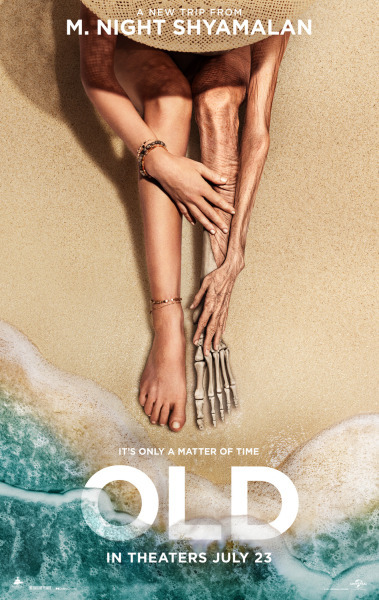
Oh you guys. You guyyyyyys. Buckle the fuck up, I am so pumped to tell you about this absolutely GONZO mummified deuce of a movie. Spoilers will be had in this one, because you need to know everything.
Old is the latest from M. Night Shyamalan and like....I think we all know M. Night’s track record. For every Sixth Sense, we also get a Happening or a Village. In some ways, he’s the most exciting director working today because every new film is a 50/50 coin toss, and mama loves living on the edge. The gist of this latest roll of the dice is that a group of different families who have all come to stay at a remote luxury beach resort get invited to go to a secluded private beach for the day, and after they arrive they discover they can’t leave. That’s not great, but the bigger problem is that they seem to be aging rapidly - like 2 years older every hour or so. That’s a solid “how are we gonna get outta this one” bottle episode premise, and in the hands of a better writer, it could be a fun sci-fi romp. M. is NOT that writer.
Some thoughts:
I should have known it would all go wrong from the terrible foreshadowing starting at the very beginning scene. The mom of our main family, Prisca (Vicky Krieps) says “You have such a beautiful voice, I can’t wait to hear it when you’re older.” The dad, Guy (Gael Garcia Bernal) says, “Don’t rush this moment, enjoy the present while you can.” BECAUSE THE CHARACTERS WON’T BE ABLE TO LATER, DO YOU GET IT? dO yOU GEt iT? Wife leaned over and said “look at all the ferns - the oldest plants!” That last one was probably her projecting, but the point stands: there is nothing subtle about Old.
There’s a lot of just like, shouting out loud the things that are currently happening onscreen. “She’s having a seizure!” “People who go back the way we came black out!” “The rust has entered your bloodstream; it acts like poison!” That’s how you tell stories, right? Just having characters point out events that are occurring right in front of their stupid fucking faces with no other commentary or reflection?
An additional element that feels woefully ignorant at best and malicious at worst is the inclusion of a black male character (Aaron Pierre) who 1) is a rapper 2) is named Mid-Sized Sedan [I’ll give you a moment to deal with that detail emotionally] 3) says the single line of dialogue “Damn.” at least 4 times and 4) suffers the bloodiest, most violent onscreen death at the hands of a racist white man who is revealed to have paranoid schizophrenia. There are other gruesome deaths onscreen, to be sure, but the worst are body horror nightmares that could never occur in the real world - a woman whose bones are breaking and setting in the wrong position nearly instantaneously until she resembles a horrifying spider creature, and the aforementioned rust-in-the-bloodstream trick that leads to a Jeff-Goldblum-in-The Fly-bubbling-skin infection kinda deal. But Mid-Sized Sedan just gets stabbed in the chest repeatedly, brutally, a bunch of times by a white guy who pleads fear for his life even though MSS posed no danger to him, and it all happens onscreen when so many other characters are offered the mercy of offscreen deaths. I’m not sure if M. is trying to throw some real-world horror in and he’s just shit at it, or if it really didn’t occur to him how malicious this inclusion feels in a fantasy narrative, and I don’t really care. If you have a black character in your story and they die, you better think really long and hard about how it happens and what it means and it’s clear no one did that here.
Nothing to do with the film itself, but it did tickle me that someone brought a tiny infant to my pretty packed screening. The baby was very chill, thank goodness, and as far as I know did not age up to a kindergartner during the course of the film.
There is a Very Good Dog, a Yorkie, present for the first part of the film, but unfortunately the dog dies. It occurs offscreen, and given the premise of what’s going on on this beach, it’s not a shock when it happens BUT STILL.
The old age makeup, at least on Prisca is pretty great. Good job makeup department!
At one point, Guy gets attacked by another beachgoer, and his eyesight is failing so he has a hard time fighting back. But you are surrounded by sand, my dude, and you can still see blurry shapes. You’re not gonna throw some sand in the eyes until you’ve been stabbed like 10 times? Not gonna try to push him down, or sweep the fucking leg, or do anything but just keep raising your arms and getting stabbed while yelling “I’ll protect you!” I’ve seen stale tuna sandwiches with better defense mechanisms than you.
Like most fantastical premises, there are only a certain number of ways this narrative can end that really make any sense. It reminds me quite a bit of 2019’s Brightburn which was like “what if Superman but evil?” Either everyone is gonna die, or someone is going to improbably survive and you better have a real neat explanation for how that’s possible. Oh M. Night, when will you realize that your explanations are never as clever as you think they are? There’s no “twist” here really, simply a reveal, and it’s the equivalent of eating one of those sugar-free, gluten-free, egg-free, dairy-free snack cakes I broke down and ate out of desperation when I was on Weight Watchers. That shit is “food” in the same way that the climax is a “logical explanation for all this.” Big Pharma is luring sick people to the resort through targeted ads, then arranging these excursions to the wacky time beach in order to test how medicine they secretly slipped into the guests’ drinks works over decades of life. These sneaky medical breakthroughs are saving hundreds of thousands of people’s lives, we’re told, and the scientists offer a moment of silence for each fallen group of unwitting human lab rats after they inevitably die. Because if there’s one thing the world needs right now, it’s more distrust of pharmaceutical companies and the ethics of modern science! I can’t think of one possible reason we’d want to portray molecular biologists, immunologists, and virologists in a positive light right now, can you? When will those assholes get off their high horses and stop being universally trusted and beloved by everyone, am I right??
My saddest takeaway, tbh, is that this is a stacked international cast, with at least half the roles going to POC - this is the future liberals want, etc etc - and the result is THIS.
Did I Cry? Of course not.
Not all is terrible! It’s a beautiful movie to look at, because M. Night’s direction is never the problem, but combined with the script, the acting, and the absurd narrative leaps needed to make this story make even a little bit of sense, the whole thing turns into a mess. Unfortunately, getting Old with M. Night is less “leisurely retirement at a plush resort in Florida” and more “rancid can of Ensure and a poop-choked pair of Depends.”
If you liked this review, please consider reblogging or subscribing to my Patreon! For as low as $1, you can access bonus content and movie reviews, or even request that I review any movie of your choice.
#121in2021#old#old movie#old 2021#m. night shyamalan#old review#vicky krieps#gael garcia bernal#alex wolff#aaron pierre#movie reviews#film reviews
45 notes
·
View notes
Text
Off script
I did it. I worte something in the middle of the night and finished it just now.
This is me stretching my writing muscles. It’s unrevised and more than a little bit on the “trash” department, but I wrote it, so I thought I’d share it.
It’s Kastle. Obviously.
I have to go. I’ll review it when I come back from the vet with my dog.
Thanks. Bye. Hope you like it. It’s trash.
-------
She had been very matter of factly. Way more than he anticipated, and he had anticipated it.
He, on the other hand, had been ridiculous. Completely and undeniably ridiculous, unable to act according to his own resolutions.
Frank had, for lack of a better word, rehearsed it. Their first meeting since their last one, that one where he just vomited words on her face, spoke without thinking, acted on momentary emotions, letting his confusion, his trauma, his stubbornness and pig headedness do the talking, resulting in distance, estrangement and, most definitely, deep, profound hurt.
It had been their first meeting since that day, but not their first contact. Surprisingly, at the same time their strange relationship agonized, hers with Madani flourished, a friendship that was both startling and predictable.
Friendship and professional collaboration, more often than not. And it had spilled on him, this time.
(If ever she had children, Madani would make a very overbearing mother, Frank was willing to bet. She won him over by sheer persistence, and he was known as a stubborn man himself. Not delicately or diplomatically at all, she strongarmed him into consulting on her cases, forced a “job” both on him and her agency, cornered and bullied him into working for her, only to leave him wondering how the hell he had gotten there.)
And there he was, because of two women’s partnership, sitting on a bench in Battery park, watching as the wind made long strands of Karen’s hair twirl around her face, eventually catching on her lip, only to be pulled out by a finger while she talked, looking at a bunch of papers, explaining things to him that he should be listening, he should be paying attention, but he had just missed her so much, so much more than he even knew, it was like a punch to the stomach.
“He was in Jersey on the 7th, by my accounts, but then he was tagged on a social media post, attending a party in Dubai three days later. That time window could be important, because Alec was-”
He heard none of it. He should, Madani was chasing this guy all around the country, and now he was going international for less than kosher reasons, and it was his job to predict his movements and place him somewhere she could catch him, and Karen had all this information - when did she not? - but right now he couldn’t even remember said guy’s name, much less why he should care where he was.
Because she looked amazing. She sounded amazing and even smelled amazing, like something fresh and coffee and paper.
She had looked at him so strangely, a simple “hi Frank” to make him turn around when she got to his bench, a polite “you look well” after sitting down, a “no, thanks” when he asked if she wanted some coffee from the place across the street. Karen hadn’t dwelled on their previous meeting, hadn’t asked questions about what he had been up to, didn’t really give him a chance to look too deep into her eyes, focusing on the file she had for him, notes for him to pass to Madani when she came back from Moscow, because he would see her first.
And Frank had predicted this. He wasn’t a complete moron, and his last words to her still sounded clear as day in his mind, even if he was all banged and drugged up on the occasion. He knew she would not be warm and inviting, knew she would be hurt still, even wondered if she hadn’t followed his advice on Matt Murdock, or someone else. It stung like a bitch to think about that, but he had considered it, to prepare for this ten minute lunch break meeting, he had spent almost six nights running through different scenarios in his mind, to prepare himself.
All in vain. All of those scenarios and rehearsed routes of conversation down the drain the moment he had seen her, heels and skirt and flowy blouse, a collapsing bun on the base of her neck, the wind, the collar of her coat and her own movements pulling and pushing strands loose.
“He does have a daughter, though, but she is not as nearly as careful as he is. Loves flaunting the rich life on Instagram, she films everything, and I got to see that her driver was the same guy that was in Jersey with-”
Curtis had been very vocal about how stupid Frank had been when he narrated the hospital room events to him, and he didn’t even know Karen.
“I don’t know her”, he had said over beers and an ignored game on TV. “I don’t need to know her, Frank, I just need to not be an idiot. Which you are, by the way, let’s make that clear.”
If he knew her, Frank was pretty sure Curt would smack him upside the head. If he could see her right then, ticking off items from her list, her pen poised on her hand as she went, sitting there with that file on her legs, looking at Frank from time to time to see if he followed - which he definitely didn’t - the crease on her brow when she focused on an item, the sheer blue of her eyes, the curve of her neck before the collar of her coat folded over skin, those stray hair locks lifting and falling with the breeze.
Frank realized he was sitting turned towards her when his knee touched the back of the bench. Suddenly, he realized he had an elbow where his back was supposed to be, and his hand was supporting his face while he looked - stared - at her.
He was staring, full on staring, and found himself quite unable to stop.
“The problem is”, she went on. “I can’t find any record of him planning to go to Dubai. I don’t even know how he got there. His name is in no manifesto I can find, and his plane is still parked here.”
Frank had forgotten how good he felt whenever he heard her voice. He had come to expect the soothing sensation that washed over him when they spoke, even the funny feeling that would run through his skin whenever he knew he was gonna see her. But it had been a while, now, and it shocked him a little bit, that feeling. It made him want to close his eyes and get closer to her, maybe touch his nose to that spot under her ear, over that birthmark, to investigate further on the delicate scent of her shampoo. Or, maybe, rest his head on her legs, to enjoy the sound of her voice without worrying about keeping himself sitting straight.
He had been far from her for many months, and suddenly he wanted to extinguish that distance, nullify it, get as close to her as he could. He found it quite a strong urge, and discovered himself both uncappable and unwilling to resist it.
“I don’t know how long he’ll be away”, she said as he leaned closer. “But he couldn't be very long, I doubt he’d delegate that much responsibility here, there’s too much going o-”
Contradicting everything he had told himself he would say or do, Frank saw his hand, lifting and reaching for her face, in no hurry, at the same time she lifted her own hand to move another lock of hair away from her eyes.
Karen looked at him when she saw his hand, a question in her eyes, and sucked in a surprised breath just before he caught her cheek and leaned forward, noses bumping before his mouth touched hers.
Not exactly a shock. Not an electric current like he had felt when he kissed Maria for the first time, or that buzz that had happened when he kissed her cheek that one time by the waterfront. Strangely, his mouth over Karen’s felt familiar, soothing, like he had done it a million times, even if he knew very well he hadn’t, was painfully aware of every single time he did not kiss her.
She tensed against him, and her lips parted in surprise, which had been very, very pleasant - a friction against his own lips, rearranging slightly, opening up even if involuntarily - and he was about to pull back when he noticed she didn’t.
With absolutely no notion of time, he waited a second or maybe an hour, before he moved his mouth against hers, trying a bit, tasting a bit, enjoying a lot, instantly addicted to the peculiar feeling of kissing her.
His hand moved on her face, and the tip of his fingers found strands of hair. The edge of his teeth found the delicate skin of her lower lip, and he nibbled on it lightly before leaning further towards her, opening his mouth and creasing his brow in pleasure when she opened up further to him, tumbling her head back a degree or two, her small sigh threatening to dismantle him there where he sat.
Her hand found his wrist when the tip of his tongue touched hers, and there it was, that jolt, exposed live wires touching, and he tightened his grip on her face at the same time she wrenched her mouth away from his, her forehead touching his while she exhaled sharply.
“Jesus Christ”, she whispered. “Frank, what the hell?”
“I’m an idiot” were the words that came out of his mouth, both hands on her face now, sitting sideways on that very public bench, fulfilling his fantasy of touching his nose to the patch of skin under her ear, kissing the spot his lips touched, noticing her hand on his wrist was not pulling it away, noticing her posture had slumped a bit, she relaxed against the bench. “Fuck, I’m an idiot”.
“You’re… You’re aggravating, that’s what you are”, she said, her tone suggesting a reprimand, frustration, her movements indicating surrender, head tossing back to stretch her neck under his mouth, the hand not holding his against her face pulling on the fabric of his own coat. Pulling it towards her.
Frank smiled.
“Right back at ya.”
It was maybe not the best place to do this. A park in the middle of the day, with parents walking their children around, people on lunch breaks - just like Karen was - coming and going to and from all directions, perhaps it was not a good idea to just close his eyes and lose track of his surroundings like this, lose himself in her mouth and focus on nothing but her kisses, how her lips pressed against his and how her mouth opened willingly, how her tongue made a sort of shiver run laps around his spine.
She made him mellow, he realized. Not just now, she always made him want to let go of everything he was holding, from deep embedded hate and guns to the sheer notion of reality and time around him, and that’s why he pushed her away at the same time he refused to let go of her, resulting in her hurt and confusion, the definition of those “mixed signals” people loved to talk about.
Fucking great, Frank. Good job.
“Oh God, ok, ok, wait wait wait”, she said, extricating herself from him one more time when the file she had on top of her legs tumbled to the floor. “I have- I have to go back, to the… To the office, I’m late already, what the hell, Frank?”
He picked up the file from the floor, gathering a page that had fallen from it and batting park dust from it.
“I’m sorry”, he breathed, not really sorry at all for today, sorry for all those other times she reached for him so hard, only to have her hand and hopes swatted away. “I’m”, he let out a sigh, looking in her eyes, huge on him, lips parted and then not, her breathing a tad heavy, cheeks flushed.
Curt was right. He was an idiot.
.:.
She agreed to talk to him.
He didn’t know what they would talk about, but that’s what they agreed on. To talk later that same day, because she had to go back to work, so they had gotten up from that bench and she had smoothed a hand down her clothes, gathering herself.
Karen started saying something about a place she new near her apartment, where they could get a coffee and talk, more private than a park, but a curl of her hair had come to rest on her collarbone, twisting elegantly on a large curl, and Frank had found himself, again, taking a step forward and interrupting her, mouth over hers, pressing not so gently, and she let out a sort of hesitant chuckle when she pushed him away this time, closing her eyes and lifting her hand to her lips, shaking her head and then looking at him again.
Now that he had started it, it was hard to stop.
She said she would text him the address of the cafe, and looked at him with a sort of amused expectation before she walked away.
True to her word, she did text him the name and address of a small cafe, and it looked cozy when he walked by it on his way to her place.
Not that he planned on climbing the fire escape and sitting there for an hour before she got off work. Frank had not planned to go there, he just found himself walking, his legs taking him there by their own accord, the memory of her teeth against his lip and her tongue against his dictating where he was going, making him walk straight by the place she told him to go, around the block and up the metal ladder.
He sat there for what felt like forever, a cold breeze nipping his face, until he heard the familiar noise of her heels against pavement, her gait like an alarm clock, and he opened the window at the same time she opened the door downstairs.
He was ready to apologise, again, for the scare he would give her when she opened her front door to find him standing in the dark in the middle of her living room, but she just looked straight at him and shook her head, closing the door behind her again.
“I knew it”, she said, to which he smiled in spite of himself, legs on autopilot again, taking one two three steps towards the door while she stood there taking her coat off. “Jesus, what has gotten into yo-” she started to ask before he interrupted her for the third time that day, both hands on her face, taking full advantage of the privacy of her dark apartment, opening his mouth immediately to her kisses, delighted by the arms that sneaked their way up his chest and around his neck, hands on his face and down his back, gripping the fabric of his shirt, she kissed him so fully, without any guard, and he loved her for it.
He loved her for kissing him like this, he loved her for being so stubborn, loved her for standing up to him, standing with him, for pointing that gun at him that one time, for sitting with him in the hospital, for crying for his family, for fighting for him when she didn’t even know who the hell he was.
Frank loved her so much and he had known it for so long, but the realization hit like a brick to the forehead nonetheless.
“You are an idiot”, she said right after kicking her shoes off and helping him off his coat.
“Yeah”, he agreed, pulling on the string on her collarbone, undoing the knot that kept her top together. “I know.”
80 notes
·
View notes
Note
almost every cartoon youtube channel use to always rubs me the wrong way usually the way they review "modern" spongebob was going to cause the apocalypse and then rob you and then when hillenburg returned people started warming up and being a bit nicer to spunch bop but i really wonder is that they simply picked up spongebob again because of hillenburg and actually saw more modern spongebob episodes instead of cherrypicking the weaker eps hmm
in general about cartoon youtubers usually these days i feel like the early 2010s and some mid 2010s a lot of cartoon reviewers were a lot more negative for some reason but i am glad a lot more seem to have cool down and actually be a bit more positive and give real reviews and criticismm and i like the review more when they say things like "i personally didn't enjoy this but if you did i am glad you liked it!' instead of saying "this is bad because it's bad and the crew for these are horrible people and whoever actually likes these is cringe and that is fact"
You're very right! I've got more to add on this. I remember watching a lot of cartoon reviewers when I was younger. I stopped watching spongebob some time around 2011 because I just wasn't a fan of the episodes. So years later when these cartoon reviewers started popping up swearing they have an explaination as to why spongebob isn't good anymore, I believed it. I was a kid but still. There's a lot of holes in their arguments. They'd put out video after video of the same thing. Spongebob isn't good anymore because the creator left and the people working on the show now is bad. Only like the first 3 seasons otherwise you're a stupid kid.
That's dumb. Hillenburg didn't completely leave the show. He still had some work on the show. Reviewing episode plots and scripts. There's a lot of good moments post season 3. Some people straight up think some moments from post movie episodes are classic episodes and I've caught this often. The newer episodes have a lot of qualities older folks would enjoy. It isn't going to be exactly the same as the classics in tone and its understandable if you're not a fan but gosh these people have no respect.
In the early 2010s I feel like it was clickbait. It was something that can easily to get a microphone and talk about how modern spongebob is ruining the world to get a lot of likes. It appeals to the largest demographic and so why not? Its funny because most of the time they meant 6-8 and even those seasons aren't that bad. They have some weaker episodes for sure and that can be for a multitude of reasons not just "new writers bad". Even I'm wrong since I shat on those seasons before, only to find out recently from some rewatches. They aren't that bad. I mean when there's a bad episode like yeah its not great. But I think my main issue was I just didn't like the tone of the newer episodes. It was purely subjective and I couldn't see that for so long. It makes me laugh how blind I was. They're so creative too and do so much but I couldn't find myself liking them because I didn't like the chubby cheeks design on spongebob, I didn't like how slow some episodes are. Blah blah subjective stuff. And I couldn't see outside my bias. The Hot Shot is a genuinely good episode from season 8, Spongebob's Last Stand is one of my favorite SB episodes of all time, The Sponge Model is so weird, I can't help but laugh.
I'm getting off topic but I really wish it was as easy to say that they're changing now. I mean YouTube cartoon reviewers, the ones who especially shat on spongebob during the early 2010s started to turn around and enjoy the show post movie. I largely assumed it was tone change in the episodes. They started to become more spunky and goofy. Maybe that just appealed to them more. A new feel made them have a bit of change of heart. Especially watching season 9a and season 9b there's a big difference in feel.
But also like you said, they were probably only open to change because Hillenburg was now said to work on the show. Which he's always have been. Just now he's more involved than before. But since his passing, err some people have been pretty rude. I know even before people sent hate messages to the crew on spongebob. Largely fueled by those irresponsible youtube cartoon reviewers who acted like modern spongebob was the root of all evil. But now a days I feel like its too common. Probably because of all the misinformation around kamp koral, Hillenburg's passing, and also some people's dislike with the expressiveness post season 10. It's been fueling a lot of hate.
I get people not liking the expressiveness. Its not for everyone. But gosh it really isn't as bad as people make it out to be. And I hate keep running into the amount of hate people flooded the crew with. I hate even more whrn the movie came out, people acted like it was ruining the integrity of spongebob even though Hillenburg worked on it and pitched what is the main plot of the movie. And actually getting in arguments because people think I was a "movie defender" for stating the facts. They all acted shocked when they found out Hillenburg approved of the movie and Kamp Koral when Vincent Waller officially came out and said it. But for a long time, the facts were there and readily available. I admit I was wrong before since I also fell for the misinformation but even after a while, I just didn't want to fuel the hate because it drove people to do crazy shit.
Its also interesting seeing people's biases. I remember seeing a review where someone was review of sponge out of water and the person's review is essentially "I think its bad and if you like it then you should feel bad about it" someone needs to knock their ego down a bit. They were right earlier in their video that they didn't like it and didn't need to explain to people why they didn't like it. And that's right and I wish more of the internet would accept they don't need an elaborate reason to dislike something. But gosh that was a bad take.
And its funnier when the 3rd movie came out, they made a video acting like the film was hell on earth and remarked that the 2nd movie at least has some qualities and is enjoyable. Like before they weren't telling people they should feel bad for enjoying the 2nd movie.
Or how seasons 4-8 was considered modern spongebob. People shat all over it. Then when seasons 9-12 came out. They act like 4-8 is apart of the classics. Like season 8 is the last good season. It kinda feels like a joke. Or maybe they finally got over their blind hatred for those seasons and now found something new to hate because they can't let go that the classics era is long gone. I remember watching a review where some guy was just acting like seasons 9-12 is hell and was like "look how they massacred my boi" mans really was just drawn with an interesting facial expression. Calm down. And then he later admitted he never watched the modern seasons because he doesn't have the strength. He was just going off a random clip.
It gets frustrating. Tumblr here is very tame but on twitter or wherever else, some people really don't know how to behave and do research for themselves. They act like Hillenburg is some kind of god who will save the show and while shitting on the exact episodes he worked on. His name is literally in the credits before each episode.
They're like "oh I would fire all the current writers and hire the ones who worked on the classic episodes" the ones who worked on the classic episodes are working on the show now. What are you going to do? Fire them and hire them back on??
This turned into a long rant but uhh I just had a lot to share. It just gets on my nerves since the patrick show coming up adds more hate to deal with. I haven't the energy. If you have a problem with Nickelodeon's corporate decisions then deal with the executives themselves ya kno? But it wouldn't matter because people are really biased. Especially with the lasting effects of those early 2010s cartoon reviewers.

#spongebob#spongebob squarepants#sb#spongebon squarepants#the spongebob connoisseur#spongebob meme#Ask
14 notes
·
View notes
Text
The Critique of Manners, Part II
~Or~
A Candid Review of ITV's Emma (1997)
Disclaimer: I do know that both this and the Miramax version were released in 1996, but to avoid confusion, I refer to this one as the “1997 Emma” in reference to the US release date.
The bones of this review were written some six years ago after my initial viewing. I’ve watched it three or four times since then, two very recently (Within the past year). I’d started to soften on it in the most recent watch. So many people love it so much I thought surely maybe I’m just crazy or even wrong; until I found this blog post from 2008 (a year before my favorite version was released) that hit on almost EVERY SINGLE thing that skeeved me out about this version when I first watched it.
Like my previous review of Emma. (2020), I’ll be covering the cast and overall handling of the script in comparison with what I know from reading the book. I will also be commenting on my thoughts about the costumes (Whether they are attractive or accurate, or both, or neither) which will be a bit more in depth than it was for the 2020 version, and this will set a pattern for the costumes section going forward.
Directed by Diarmuid Lawrence with screenwriting by Andrew Davies (Or should I say “Written by Andrew Davies with direction by Diarmuid Lawrence”?), this version was a fan-favorite among Janeites for many years for … well, reasons I’ve never been entirely certain of. I’ve read the book twice through and referenced pertinent passages MANY times besides, and really I don’t see what they’re raving about.
Let’s dive in.
Cast & Characterization
I’d known about this adaptation for a while, but I held off on watching it, largely for one reason: my apprehension about Mark Strong playing Mr. Knightley.
I was concerned because when I watched this I had already seen Mark Strong as Sir John Conroy in The Young Victoria and as Lord Blackwood in Sherlock Holmes, both very unpleasant characters. But there have been several occasions when I expressed displeasure with casting choices only to eat my words when I actually watched the movie. So I entered into watching this with an optimistic outlook, sure that Mark and Kate would surprise me with brilliant performances. And I would like to say that they did, but that would be an untruth.
My biggest fear about Mark Strong playing Mr. Knightley was that his rebuking of Emma was going to be a watered down version of ‘RAAAWWWRRR’ that I was familiar with, specifically because of The Young Victoria. It’s very hard for me to see Mark Strong point his finger in Emily Blunt’s face and shout at her, and then watch him do the same thing with Kate Beckinsale (only somewhat less aggressively) and expect to feel all warm and fuzzy about their romance. I expected that to be a tall order. And it was. Whenever he raises his voice, the right side of his face pulls up into a snarl. Now since it does this no matter what role he’s playing I’m guessing that’s just how his face is. It’s not his fault really and it’s almost certainly unintentional, but I’ve seen that snarl before and it does NOT belong on Mr. Knightley’s face.
Don’t ever think I don’t LOVE Kate Beckinsale, and I don’t necessarily think that my problems with this interpretation of Emma are her fault; these things very rarely fall on the shoulders of the actual actors, but those of the screenwriters and directors who guide them. However – and I am aware that this might sound a bit harsh – I would say that at points, Kate Beckinsale’s performance in this movie (In my opinion) barely outstrips community theatre or even very good high school drama club level acting. It seems to me that there’s burden on her here to sound historical or period. This lends to this interpretation of Emma feeling at once both cold and childish (more on that later.)
Her best moments are when she runs into Jane as Jane is leaving Donwell and when she speaks with Robert Martin at the end of the film. I always like scenes where Emma tacitly apologizes to Mr. Martin, and her feeling when she invites him to Donwell is Kate’s finest moment in this movie.
I found Raymond Coulthard’s Frank Churchill insignificant at first, but on repeat viewings I really started to hate him. I don’t think Austen intended Frank’s caddishness (to use more modern vernacular I’d say he’s an utter “Douche”) to be quite this obvious on first glance. He’s a creep in this version and Raymond Coulthard is just not at all attractive to me, from his big nose to his little shark teeth.
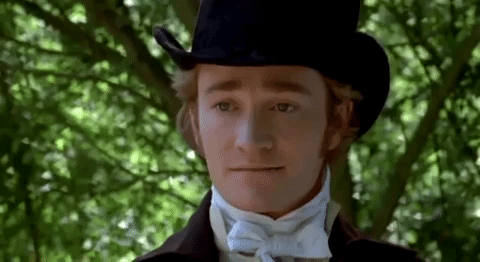
Olivia Williams was a good, even great, Jane Fairfax, and in my opinion does a much better job of portraying Jane’s vexation than, say, Polly Walker did (more on that next time), while still quietly looking like she’d like to arm-bar Frank rather than take his vulgar teasing lying down.
She also has the distinction of being the only Jane Fairfax who’s singing REALLY blows Emma’s out of the water, and I like that all of the songs she sings are in languages other than English (primarily Italian I think?). This achieves the double whammy of showing how much more accomplished she is than Emma by emphasizing that not only does Jane sing and play better, but she knows languages too.
Samantha Morton is a superb actress whom I love and I was sort of appalled at how she looks in this movie. Is she dying of a wasting illness? She looks like a gust of wind will carry her away, although since she looked the same in the 1997 Jane Eyre (In which she played the title role under similarly appalling direction) perhaps that was just her look that year?
Dominic Rowan, as Mr. Elton, is… there’s a perfect word to describe it and I just can’t think of it right now. Like every other young man in this movie (other than Robert Martin) he’s got this feeling of skeeviness to me but it’s more than that. It’s a dweebie-ness as well. This is so dissatisfactory to me because Mr. Elton is supposed to have every appearance of charm and agreeableness, with his only obvious fault being his over-eagerness to ingratiate himself to Emma and some rather vulgar locker-room type talk about marrying for fortune. He’s just so… (I’ve hit upon it now after some discussion with my sister) dingy. He looks less like a “very handsome young man” who “knows the value of a good income” and more like the kind of guy that scrubs up okay, but still you can tell from the rumple of his clothes and the pizzaroni odor wafting from him that he lives in his mom’s basement.
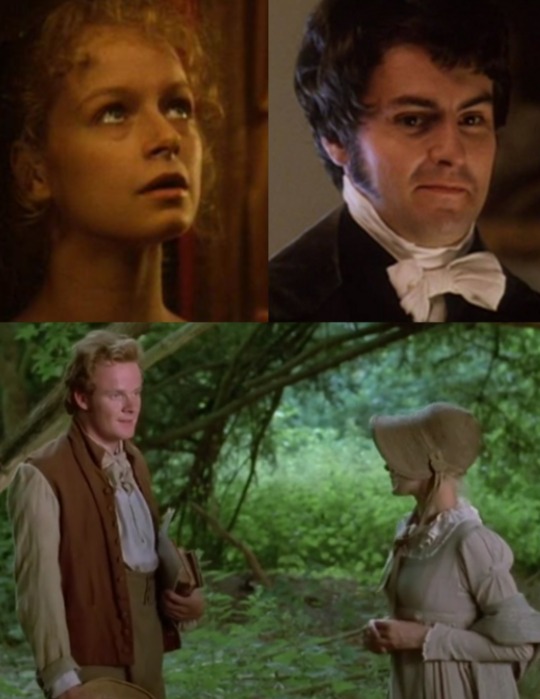
The shining star for me in this production was Alistair Petrie as Robert Martin. I love him as an actor and especially after watching him in Cranford, I think he was an excellent choice for Harriet’s Mr. Martin.
Davies wrote the character to be a little more romantic (Actually buying Anne Radcliffe’s The Romance of the Forest, where originally Mr. Martin was supposed to forget to – something Emma uses as a mark against him to prove how he will age into an “gross vulgar old farmer” who is “obsessed with profit and loss”.)
I especially like an inserted scene where Mr. Martin, working in his field, sees a distressed Jane Fairfax from afar as she is walking home (I think from Donwell). I thought it drew an interesting parallel between two emotionally wronged characters that otherwise would have no interaction.
What’s with Mrs. Elton (Lucy Robinson)? I don’t think nearly enough people question this. I’ve seen it explained away as her being from Bristol and trying to make herself sound more hoity-toity to hide the fact that she’s New Money. I’m not positive on what a Bristol accent sounds like (For that is where Augusta Hawkins is from) but… this sounds like an American trying to sound posh. At some points she almost sounds Texan. It’s all very confusing, because the actress is British.
Prunella Scales lists among her achievements being an outstanding actress and comedienne, as well as bringing into the world Samuel West, one of my all time favourite British screen crushes. She's probably best known for her work on Fawlty Towers, so its interesting to see her range as much less inscrutable Miss Bates. Her performance is by the book, but so much more engaging than Constance Chapman's 1972 offering, although i find her perhaps a shade too placid. She lacks a certain nervousness that I associate with the character (for more information, see my previous review.)
As for Bernard Hepton as Mr. Woodhouse, I can only say I. Didn’t. Like. Him. I have every consciousness of this being a personal bias. I have seen him play too many insufferable characters in too many things to like him as Emma’s lovable if tiresome father. This isn’t a knock on him or his performance; his reaction to Mrs. Elton is some great subtle visual comedy, this is just a me thing.
Another one of the better characterizations, though a relatively small role, is John Knightley. Played by Guy Henry, he is shown to be a good father, and an “Gentleman-like man”, with just the right blend of good humor and caustic comments.
Sets & Surroundings
I’d never paid MUCH attention to or questioned the houses and interiors used for estates in Austen adaptations until the 2020 version of Emma used such ridiculously lavish houses for relatively provincial gentry it forced me to sit up and pay attention. I think the houses used in this version are mostly suitable.
The part of Donwell Abbey’s exterior is played by Sudeley Castle in Gloucestershire. The Key words for Donwell from the text are “rambling and irregular” and while perhaps not as big as the Former Claremont House (Which, it is believed, was Austen’s inspiration for Donwell Abbey) it definitely is a suitable architectural style and situation and furthermore, having been purchased in the 19th century by a glove manufacturer and having been up to that point left in a little bit of a state of disrepair, fits the “neglect of prospect” Austen describes as well. Its interiors are a cobble-work of the Great Hall at Broughton Castle (Oxfordshire), various rooms at Stanway House (Gloucestershire), and the Strawberry beds at Thame Park (Oxfordshire)

(Top, left – Sudeley Castle; Bottom left – Trafalgar Park; Right – Dorney Court)
Trafalgar Park in Wiltshire and its interiors (a minty sage-green drawing-room fitting in perfectly with the mint-chocolate – primarily chocolate – color palette of the production) played the role of the Woodhouse’s home, Hartfield. A typical Georgian style house in red brick, I believe is consistent with Austen’s description of a “well built, modern house”.
Dorney Court in Buckinghamshire was used for Randalls, Mr. Weston’s recently purchased estate. It’s a Tudor style red brick house and it looks pretty on the mark from the front facade, but I think it’s still too big for a “small estate” with only two guest rooms (Although there’s no panic about the snow in this version – perhaps because it’s already snowing when they set out.)
My biggest problem is the lighting of this movie. I understand natural lighting and I LOVE it when you can even it out – but it is so dark in the evening scenes that it adds to the colorlessness of an already colorless production.
Fashion
Oh Jenny Beavan. You are a well-respected costume designer with good reason. However, I know that most of these costumes are rentals, but why is every-fucking-thing in this movie a shade of brown, beige or green?
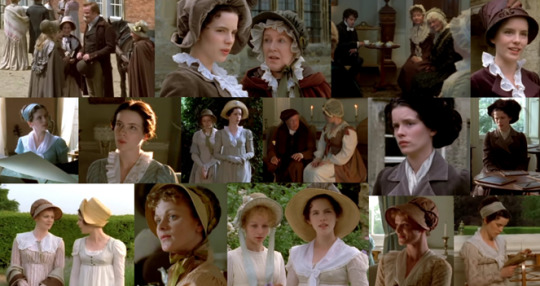
As you can see, a rich tapestry of brown and beige. And this isn’t selective. this is (just about) every day-wear outfit in the movie (barring repeats and a few exceptions that I’ll give mention to below.)
Emma’s outerwear is brought to you by Hershey’s Chocolate. Also I’m not certain but I think that her light brown redingote is the same one as Elinor’s in the 1995 Sense and Sensibility? If anyone can confirm, drop it in the comments.
Perhaps the evening wear will be more colorful?

Barely – Mrs. Weston in a brownish orange; Mrs. John Knightley in an orange-ish brown; Emma gets a dark blue? Or is that just the wintery glow from the window on a dark green velvet? Green (either so dark it’s almost black, or washed-out mint) appears to be the only color Emma is allowed to wear other than brown or ivory/white. Even her gown for the Crown Inn Ball (upper right) is an underwhelming and rather dingy ivory. The champagne number she wears for Christmas at Randalls is not only lack-lustre, but also sports what I’m now calling a “Bridgerton Bust” (where the Empire waist comes up too high, with the seam apparently resting across her bust rather than under it.)
The pink frock (seen properly only from the back) on Mrs. Weston is as close to real color as a main character gets in this production, and can be recognized as one of Jane Bennet’s dresses from the previous year’s Pride and Prejudice.
Even Jane Fairfax doesn’t get a break. Rather than putting her in Jane Fairfax Blue ™ (honestly, Jane Fairfax being costumed in blue is so consistent at this point Crayola should just name a crayon in her honor - this is gonna come back in future reviews) she gets a black-green evening number with no trim at all, and a succession of what the Ladies over at Frock Flicks like to call the “Dumpy Regency Little White Dress”, or drab gray-blues.
Some of the background dancers in the Crown Inn Ball scene get to wear pink! Why not put Harriet in a nice pink frock for this scene?! Why is this so difficult?!
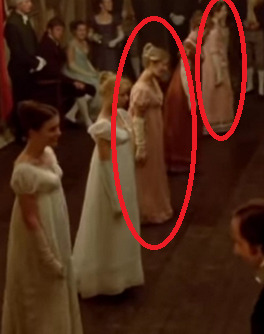
Strawberry picking at Donwell is the only time main characters are consistently wearing identifiable colors that aren’t brown or green: Mrs. Weston in pink, Miss Bates in (oddly the most colorful dress of them all) a nice refreshing lavender blue; Jane gets grey/blue and Mrs. Elton, a pastel mint. Harriet is also given a little break in Mrs. Elton’s introduction scene in a (very) pastel blue frock, while Emma sports white (with a trademark green shawl.)
So how about the...
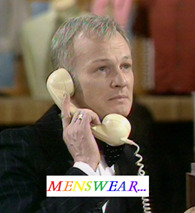
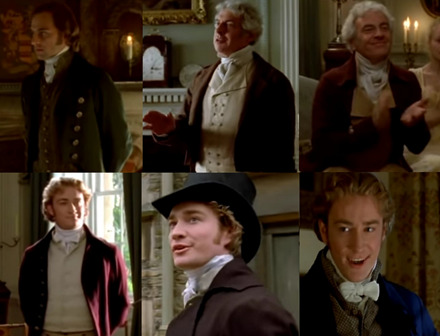
Similarly dull. I almost screamed for joy when I saw that Frank’s jacket was actually blue, and a vibrant blue at that. (The red is too close to brown, I’m sorry.)
So yes, in short the costumes, while perfectly technically accurate (I didn’t get a lot of caps of them but the trousers sufficiently tight, not that I care to look), are drab as a peahen.
As always I’ll outsource any dancing critique by linking Tea With Cassiane on YouTube, since I find her insights on the approach to dancing in Austen adaptations just fascinating and I would like to share such witty and informed reviews.
The Andrew Davies of it All…
*Strong Opinions Ahead*
There are so many reasons why this adaptation isn’t for me. First of all the very idea of making Emma, one of Austen’s most socially complex works (certainly her most vivid) into a sparse 107 minutes is baffling to me. Perhaps I can understand if it’s a Theatrical release but this is a TV production. Why not at least make it a two part special?
And besides the issue that, in order to make this fit the time frame, the story is severely truncated, there’s… the Andrew Davies of it all.
I have some issues with Andrew Davies’ screenwriting for this adaptation particularly. A LOT of issues. Where does one start? I think Knightley is a good place.
It’s not just the casting I don’t like here; but it does say something to me that they chose Mark Strong for this role. It’s a casting decision I discovered with disbelief when I first saw clips from this version in a Period Drama men compilation video on YouTube. I mentioned above that I know Mark Strong as unpleasant characters with man-handling habits. That’s the kind of role Mark Strong is associated with because that’s just what he does well. And I think this played into the casting here, because Davies’ interpretation of Knightley is a bit… fierce. He shouts SO MUCH in this movie and in scenes like the Harriet Smith debacle (where Mr. Knightley of the book even gets a bit angry with Emma) I can understand this, perhaps. But in the book Mr. Knightley takes many pauses to collect and calm himself, because his goal is not to quarrel with Emma but to argue a point. 97 Knightley takes no such pauses and spends the whole scene in what some might call an escalating rage.
Knightley’s cheerful arrival to Hartfield to tell Emma that Robert Martin intended to propose to Harriet is cut out so we start right off with his indignant exclamation of “She refused him?!” and it’s all go from there. To make matters worse, Emma’s own arguments are crippled by Davies’ editing. Many of her more (what might even latterly be considered “feminist”) arguments are cut out. In fact once Knightley gets going, he juggernauts his way through all of his rebukes and speeches from the book, but Emma hardly gets a word in edgewise after arguing that Robert Martin is not Harriet’s equal. What Austen wrote as a heated debate is turned by Davies into a one-sided tirade. (By don’t take my word for it, watch the clip.)
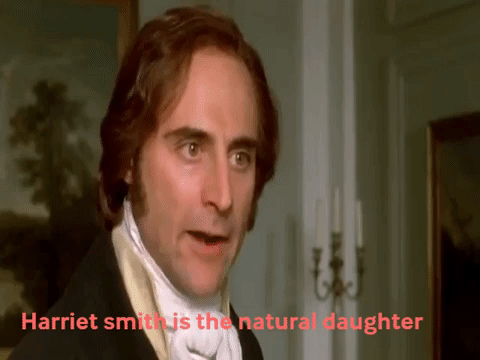
The final cherry on top is having Emma, after Knightley leaves the room with the last word firmly in his grasp, childishly pout “You are wrong Mr. Knightley, and you will see you are wrong and then you will be sorry.” I half expected her to cross her arms and stomp her foot. Worth noting is the fact that Davies adds an additional “It was badly done. Emma,” in this scene where there was none in the book. Rather overkill to my mind. Is this his catchphrase?
At Box Hill, Davies has Knightley begin his climactic rebuke of Emma’s insulting behavior by grabbing her arm and hauling her aside, and concludes by leading her, still holding her arm, to the carriage. Well at least he doesn’t shout at her in this scene; but again, all but one of Emma’s responses are cut out and she stands there, pouting until Mr. Knightley leaves and then she bursts into tears.
When Mr. Knightly proposes to Emma I was feeling good about this scene, until he dropped the “I held you when you were three weeks old” line, and I immediately felt uncomfortable. Maybe you DON’T want mention how you held her when she was a baby after you asked her to MARRY you. But perhaps worse is Emma’s response to the line: “Do you like me as well now as you did then?”
Bringing up holding Emma when she was three weeks old at the proposal (A line which was not in the book) is bad enough but there seems to be a peculiar repeated emphasis on Knightley recalling Emma as a baby. He dragged it up previously when he and Emma make up after the Harriet debacle, as he holds John and Isabella’s baby daughter (whose name, I would mention, is Emma.) In this instance too, the line is a Davies addition.
Let’s talk about Knightley’s strawberry line.
This is delivered in voice-over as a transition to the strawberry picking party at Donwell, and is portrayed as a formal invitation: “Mr. Knightley invites you to taste his strawberries, which are ripening fast.”
At first I was confident that I was reading too much into this (but I think at this point I can safely say that I’m not). I can’t help bursting out laughing every time I hear that line. It was a questionable way to word that if you ask me, especially considering that this is (once again) NOT the line in the book, and it was NOT a formal invitation. It was said to Mrs. Elton and intended to be a joke.
“You had better explore Donwell then,” replied Mr. Knightly “That may be done without horses. Come and eat the strawberries; they’re ripening fast.”
‘ If Mr. Knightly did not begin seriously, he was obliged to proceed so...’
And here I thought Janeites hated adaptations that cut out “Miss Austen’s biting wit.”
To top it all off, we have Frank Churchill (Who I have already pointed out is a bit of a creep in this adaptation and even more detestable than he already was as Austen wrote him) praising Jane: this would be fine, if he wasn’t drooling into Emma’s ear about the turn of Jane’s throat, (He actually utters this line)

and how fine his dead aunt’s jewels will look against her skin. May I just be the first to say “Ehewhegaugh”.
I juxtapose this with the book where Frank's lines are almost exactly as Davies renders them, except Jane Austen never wrote the "have you ever seen such a skin?" Line. The difference i have highlighted in bold:
"... She is a complete angel. Look at her. Is she not an angel in every gesture? Observe the turn of her throat. Observe her eyes as she looks up at my father. --- You will be glad to hear that my uncle intends to give her all my aunt's jewels. They are to be new set. I am resolved to have some in an ornament for the head. Will it not be beautiful in her dark hair?"
Because talking about how pretty your fiancee's hair is, is normal and marginally less creepy than talking about what a fine skin she has or how lovely your (i cannot stress this part enough) dead aunt's jewels will look against it. Davies' script also makes no mention of having them reset, which makes me think he’s talking about the actual necklaces and bracelets Mrs. Churchill would have worn.
But hey, maybe its just a me thing.
Harriet Smith’s story suffers, primarily, I can with some candor admit, due to the time constraints. After Mr. Elton is married, we never see Harriet in any distress. It’s almost as though she’s forgotten all about it! Emma never has to appeal to her to exert herself or to move on. Perhaps this is better than Doran Godwin’s Emma gaslighting Harriet and manipulating her by constantly chastising her for… well general heartbreak (but that’s a bugaboo for a different review.)
My last complaint of note is that ludicrous harvest feast at the end of the movie. The whole concept of this scene just does not seem at all Janely to me. I was under the impression that I was meant to be watching an Austen. Not some bullshit Thomas Hardy knock-off. This is another Davies touch and I hate it more on the principal that it is one of his numerous, obsessive tweaks made solely to point out the existence of the lower classes.
If Davies wanted to show Mr. Knightley’s being an attentive landlord and gentleman farmer then I don’t see why he couldn’t just show Knightley actually running his farm?
“Okay’, you might say, “but I think the highlighting of the servants is to show how good Knightley is by treating them like real people compared to everyone else”, and I hear you. And in the situations where that is the case, like him greeting the Woodhouse’s butler and asking after his family I think that’s totally fine and in character. But things like the servants moving the knee cushions every time someone moves down the line at strawberry picking, to me, is AS ridiculous as the “servants clipping the lawn on their hands and knees with tiny scissors” trope. Like we get it, people took the lower classes for granted, but I don’t think it’s a stretch to say that it would be easier and more realistic to have Mrs. Elton have to move her own knee cushion. I don’t think Knightley would instruct his servants, who he treats so well, to do that kind of thing, but you could write in Mrs. Elton’s expectation of it if you wanted. It seems like the kind of thing she would expect the landed gentry to do.
Screenwriter for some of the best loved Austen’s (including the sacrosanct 1995 P&P Mini-series and my favorite Sense & Sensibility), I thought of Davies for years as untouchable; until Sanditon happened and left everyone who knows anything about Jane Austen really wondering where this mess came from. I put it to you now that it was there in Davies all along.
Davies admitted, when talking about the drastic “Sexing Up” he did in Sanditon that he felt Austen’s works could have done with a bit more sex appeal. I can hardly disagree and additions like Darcy’s little swim in the pond and Edward Ferrars’ angsty wood-chopping are welcome and beloved. But it seems that what he really wanted all along was what he gave us in Sanditon; and finally, without actual source material to stand in his way, he had a chance let his dirty old man show and gave “Austen” the sexing up he thought it needed.
And it gets more troubling as you look back.
In my opening paragraph to this review I mentioned a 2008 blog post that not only agreed with me that there’s something very off about this screenplay, but gave me some possible insights as to why. It points out numerous things that I have always questioned in this version but have never seen anyone else criticize (though I am informed that more recently it has gained its’ share of critics). In fact the post itself actually points out that almost no one in the Austen Blog-sphere had (at that point) criticized this version’s faults in any meaningful way, but my favorite thing about it is that it points out what you find in Davies’ screenplay if you pay careful attention to it “Rather than sitting there and cataloguing what is “technically faithful and whatnot”.
Many Austen bloggers have kind of been playing Miss Taylor to Davies’ Emma for some two decades and change.
The most troubling thing of all is Davies own comments on Mr. Knightley (and other things, more inferred in his screen play). All of the aspects of this interpretation of Knightley that I mentioned earlier seem to stem from the fact that, as quoted in Sarah Caldwell’s book on his works, Davies thinks there’s “Something odd going on with Knightley.”
Davies clearly reads foul, or at least questionable, intentions in Mr. Knightley but I find it interesting that, rather than cutting out material he may have found troubling about Knightley in the book out of his screenplay, he doubled down by adding MORE troubling lines and situations (that were never in the book at all, and imagined solely by himself) in a romantic story with a happy ending.
Perhaps there’s not so much something odd going on with Knightley, Mr. Davies, but with you.
Final Thoughts
At this point I might ask what it is that everyone sees in this version that makes them think it’s so perfect, but that would be a bit pointless since all I’ve read since I discovered this version is people on elaborating on just that and I don’t care to hear much more.
“The lines are verbatim!” textually, perhaps, but it’s the ones that added that trouble me.
“The leads have so much chemistry!” I’m glad you think so, but I can’t find it.
“The costumes are damn near perfect!” And brown. So, so very brown.
As a 90's TV period drama, this version is pretty standard. It sticks to the book (except in those places where the screenwriter saw fit to dabble with some subtle but troubling suggestions about the characters.) And if it floats your boat, as always I'm glad it gives you what you want from the story.
I know I hold unpopular opinions on Jane Austen adaptations, and perhaps this is one of them, but every time I watch this version I feel the need to read the book as a cleanse. Perhaps Davies’s ferocious Knightley was simply a pendulum swing reaction to Douglas McGrath’s almost too laid back interpretation in the Miramax film from earlier in 1996, but even if that’s the case it’s just uncalled for and is my biggest turn off for this film.
Tone: 3
Ribbon Rating: Badly Done! (40 Ribbons)
Casting: 5
Acting: 6
Scripting: 4
Pacing: 2
Cinematography: 4
Setting: 3
Costumes: 5
Music: 2
Book Accuracy: 6
29 notes
·
View notes
Text
OKAY. SINCE ANONS SEEM TO BE INTERESTED. HERE IS MY DAWSON’S CREEK 1X01 REVIEW.
@jayciethings IF YOU ARE INTERESTED.
1. I think the opening scene does a good job in establishing the central struggle of the season and it does it in 3 minutes: 1) things need to change and Joey wants them to 2) Dawson doesn’t see why anything has to change and doesn’t see what Joey is trying to say 3) burgeoning sexuality 4) Joey-Dawson friendship.
2. I also think the Joey-Dawson friendship is also established really well and it’s actually a time where dialogue and action work in tandem. They give a brief history/overview of their friendship: “you’ve been sleeping over since you were 7″ “i’ve seen you pick your nose, scratch your butt” while also showing them watch tv, playfight and ultimately end up sleeping in the same bed, like they did when they were 7.
3. I actually don’t find the dialogue as annoying right now.
4. I will forever be angry that they didn’t pay to have the original music with their scenes because Dawson’s Creek is not Dawson’s Creek without “I Don’t Wanna Wait”.
5. “He did it again, he grabbed my ass.” “Like you even have one.” Joshua’s delivery is perfect because it’s resigned and un-offended.
6. “I’m Jen.” “Oh right, the granddaughter from New York.” That actually isn’t clunky. It’s a good way to do exposition.
7. “You look different.” “Puberty.” LOL Joey Whitter sass.
8. Honestly, at least so far, Joey’s behaviour makes sense for a 15 year old girl who is in love with her best friend who doesn’t see her as a sexual being and then has to watch him salivate over The New Girl. No, that isn’t Jen’s fault but sometimes people on this site act like teenagers or adults for that matter don’t have messy and not-so-great emotions/reactions to things. Unless, apparently, they’re men who are rapists and serial killers, then the understanding is boundless.
9. It’s actually refreshing to hear “Mr. Leery” “Mrs. Leery” since teens in shows now just call adults by their first names, which I would NEVER do. I still can’t do that. If I had to address initiumseries’ dad it would be Mr...
10. I also think it’s funny that this dialogue is being made fun of but this kind of cadence and irony is the kind of thing shows go for now -- Riverdale tries to emulate this and I would argue Euphoria tries to do an edgier version of this. Like Nellie insulting Pacey, that kind of tone is what they’re trying to go for with Cheryl.
11. I’ll admit this is more fun than I thought it would be so far.
12. I LOVE WHAT’S EDGY FOR THE NINETIES. SHE IS IN A SUNDRESS. SETTLE DOWN.
13. “I have it on pretty good authority that mothers have excellent sex.” LOL Pacey, dick move.
14. Renting The Graduate, how on the nose.
15. THEIR CLOTHES ARE SO 90s.
16. The soundtrack pisses me off so much.
17. Oh Dawson. I knew so many self-important, I’m-so-deep-I-like-these-kinds-of-movies or -this-kind-of-music boys in high school. Like I find it so typical that he thinks his obsession with Spielberg would interest Jen.
18. Dawson taking Jen to his studio is like Klaus taking Caroline to sees his drawings.
19. Oh man, I remember being a kid and watching these teen shows with my cousin and seeing how Capeside High School was with everyone on a quad and throwing footballs and being like HIGH SCHOOL IS GOING TO BE LIKE THAT and my cousin just being like

20. I like how Dawson’s Creek is the whitest show and they still managed to have more Black extras than Gilmore Girls.
21. Dawson and Jen actually have a nice chemistry. But everyone is coming on super strong with Jen and she’s just kind of like, this seems normal.
22. The film teacher is a dick for no reason. I’ve had my fair share of dickish teachers but this is excessive right off the bat.
23. Lol poor Jen, she really is trying with Joey.
24. I like how a status of Joey’s class is the fact that her sister is engaged to a Black man *eye roll*
25. I don’t know of any school where teachers ate in the cafeteria with the students. In my school there were teachers who supervised the cafeteria but that’s it. Wow, I spent like no time in my high school cafeteria.
26. “I’m having a climax issue”
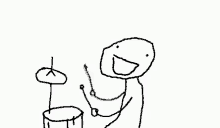
27. Tamara, Ms. Jacobs, you should be in jail.
28. I like how this school LOOKS like a school.
29. Ugh, a trans jokes. Ugh, there was so much of that in the 90s.
30. “Nothing has to change. We can talk about anything.” Honestly, from a screenwriting point of view, this is a solid pilot. I remember in a screenwriting class I took, we studied The Social Network and every 10 pages someone calls Zuckerberg either an asshole or a jerk or something in that vein as a way to reiterate a key part of the theme of the movie and while I don’t have the pilot script in front of me, DC does reiterate the theme of the season frequently without it being repetitive.
31. The dialogue isn’t as hyperbolic as I remember tbh. And I’m going to say it again, shows are aiming for this, even the one episode I saw of the Winx Saga, when they try to flirt about mansplaining, when she’s fighting with her mom about how she’s not a feminist, they’re trying for this. But DC manages to make it more natural and it’s because the Core 4 have a charm. Even if you hate Dawson.
32. Who is Dawson’s dad. Is he in something else?
33. No, I just think he looks like Dr. Cox.
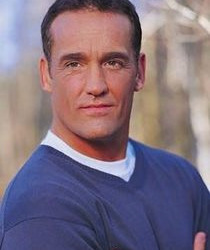
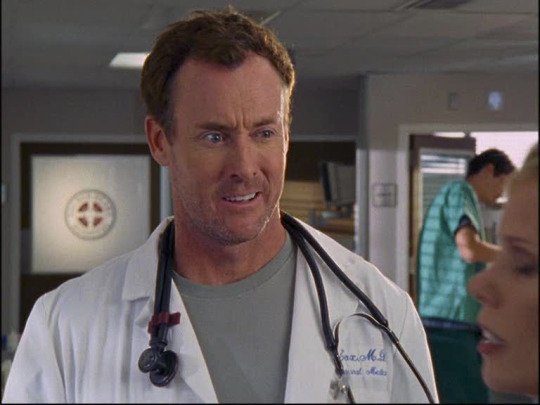
34. Dawson’s rant about sex not being important is hilarious. Yes, Dawson, you’re just pursuing Jen out of intellectual and philosophical desire.
35. I like how Joey is supposed to be a tomboy just because she’s the only girl/woman in Capeside who doesn’t wear a sundress.
36. Poor Jen.
37. Joey is super dramatic, I get that, but I kind of love it because I’m going RELAX but the way I would to a teenager. Like CALM. DOWN. Also “all I do is understand” is something that we needed to see more of before that argument.
38. Dawson, you never ask anyone else any questions about themselves, lol.
39. “How can you say you were just renting a movie??” Pacey is such a fifteen year old and I do wish the show would just ... let him be one? And what I mean by that is Pacey is supposed to be the friend with the edge, the fact that he “pursues” Ms Jacobs is supposed to attest to that fact, it’s framed as taboo and yet they’re presented as being on equal footing, even the way her date moves to grab him out of his seat when the fact of the matter is, he’s a kid, and if the show didn’t actually make the Tamara/Pacey relationship a storyline and made it about another way teenagers have certain idealized perceptions of relationships or apply kid knowledge to adult situations which still makes them kids, it would’ve been interesting too.
40. Dawson is literally dressed in different shades of beige. If that doesn’t say everything you need to know about his character --- which is intentional. But like jfc man.
41. I love that they can’t say “masturbate” so she has to say “walk your dog” I LOVE THE NINETIES.
42. And you know what, after that question was asked, the sheer heartbreak on Joey’s face and the sadness in Dawson’s eyes is done really well.
43. LMAO SO ANGSTY. No one does angst like the 90s.
44. And legitimately, the ending of this pilot is great screenwriting because a change is noted, the beginning of the episode, Joey does end up staying the night, the end of the episode she leaves because they both realize it’s true that things are changing and yet Dawson answers her question about what time of day he masturbates and to who because they’re still Dawson and Joey. And that’s the way a pilot should be written.
OK. I’ve done it.
32 notes
·
View notes
Text
COVID-19 Reading Log, pt 18
Man, this past month has been a heck of a year, hasn’t it? I’ve still been reading books, but my pace has ebbed and flowed, and I forgot to update this for a while. So here’s my thoughts on ten of the most recent books I’ve read.
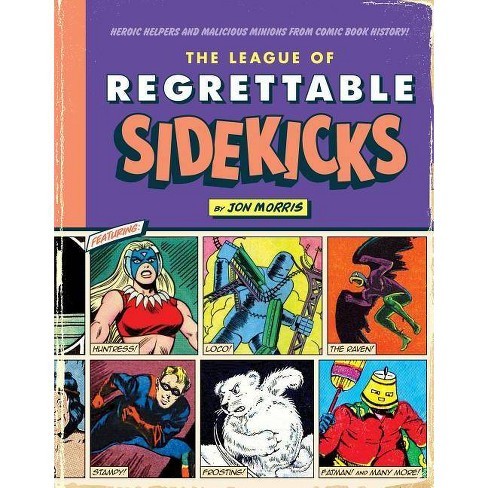
91. The League of Regrettable Sidekicks by Jon Morris. I had no idea this book existed until I was doing image searches for this project for the other “League of Regrettable X” books. This one covers the sidekicks, minions and goons of comic history. Unlike the other books by Jon Morris, the spread is more even of Gold/Silver/other ages of comic books. After all, the 70s is when Jaxxon the green rabbit appeared in Star Wars, and the 80s had a shape-shifting penguin named Frobisher in the Doctor Who comics. It also feels like it’s a little looser about what makes a character “regrettable”. Some of the sidekicks in its pages, like Woozy Winks and Volstagg the Voluminous, are legit great characters.
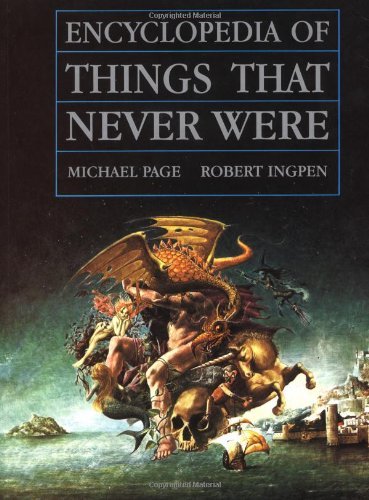
92. Encyclopedia of Things That Never Were by Michael Page and Robert Ingpen. I wanted to like this book; I really did. For one thing, it was recommended to me by @listmaker-lastcity, who I was working with on commissions. For another thing, it was fairly pricy used. Thirdly, to its merit, it is gorgeous. Michael Page, the illustrator, is credited first, and rightly so. But for an “encyclopedia”, it makes up a lot of stuff. It opens with a disclaimer that “the creators of this book have… unlocked their own fantasies”, which means that it invents Arthuriana and Greek myths wholeheartedly. Several of the entries do not exist outside this book, and others are so distorted that their actual folkloric origins have been clouded and obscured by people using this as a source. For material I’m not familiar with the primary sources of, like Gulliver’s Travels, I have no idea if it’s reflecting the source material accurately, or making things up whole cloth. As a fantasy, it’s intermittently fun; some rather nasty misogyny does sneak in and the book is wildly anti-science. As a reference work, it’s useless to the point of actively harmful.
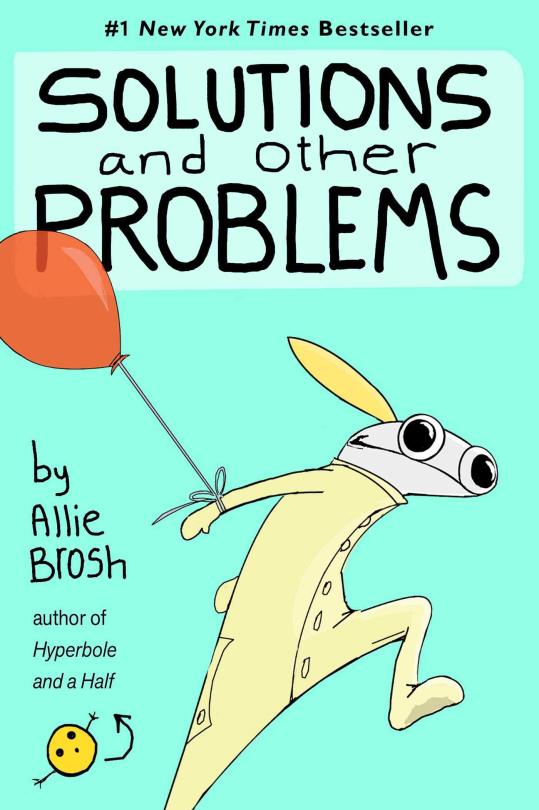
93. Solutions and Other Problems by Allie Brosh. I was a huge fan of the “Hyperbole and a Half” blog back in the day, and knowing Allie Brosh’s history of mental health problems, I was worried when she seemingly dropped off the face of the earth. Her release of a second book was a pleasant surprise, but also showed that some worry was appropriate. This collection of essays, cartoons and heavily-cartooned essays is sadder than the first collection, as it was written during and after a series of family tragedies. It is still very funny in parts, however, and has an overall message of self-care and love that turned out to be extra relevant in the nightmare year that is 2020. It’s the only book for this project that I read in a single sitting. Highly recommended.
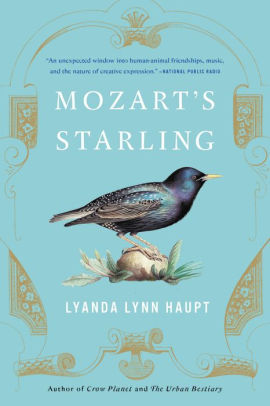
94. Mozart’s Starling by Lyanda Lynn Haupt. This book is half memoir, half biography. The composer Mozart owned a starling during some of his most productive years as a composer, and even wrote an elegy to it when it died. The author used this as a launching point to adopt her own starling, and to examine how this invasive species is seen in American birding culture. The writing is humanistic and charming, and very self-aware (the author worries that her starling is going to die, because that’s what always happens in “this animal changed my life” books). The message is one of respecting all other creatures and of valuing the lives of animals, which is not much of a surprise from the author’s other books (I covered The Urban Bestiary earlier in this project.
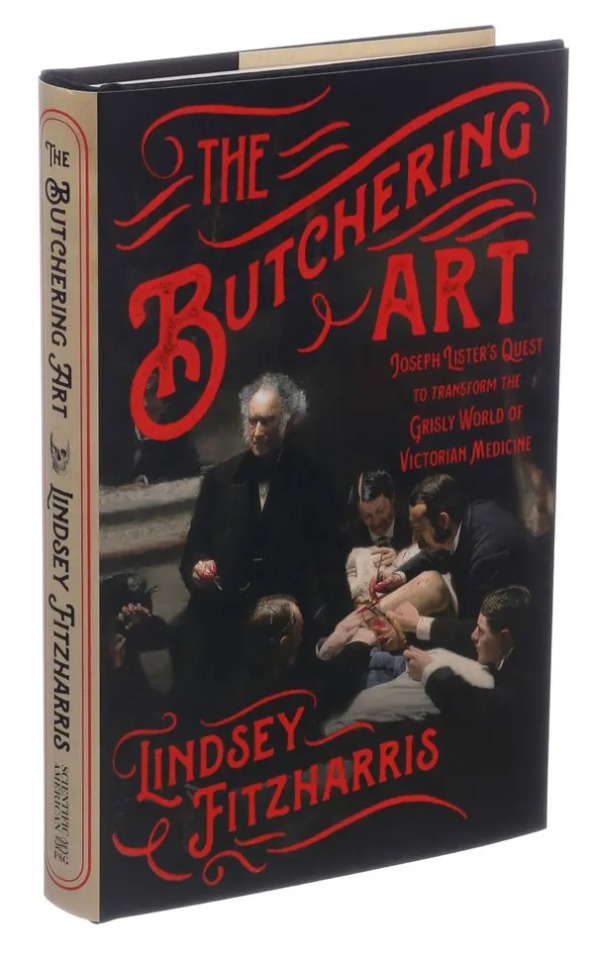
95. The Butchering Art: Joseph Lister’s Quest to Transform the Grisly World of Victorian Medicine by Lindsey Fitzharris. The subtitle says it all; this is a biography of Joseph Lister, focusing on his research into antisepsis and promotion of sterile technique in surgery. It takes ample digressions to talk about other major surgeons of the time, the state of hygiene and disease theory in Victorian England, France and the United States, as well as things like labor conditions and women’s rights. These bits and pieces are woven in successfully, so they feel like appropriate context setting. Fitzharris is empathetic despite the often grisly subject matter, but readers with a sensitive stomach and a low tolerance for gore might want to skip this one.
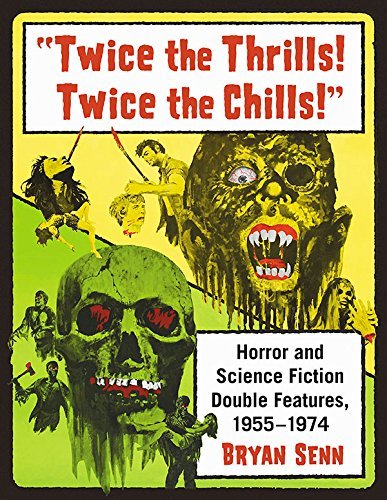
96. Twice the Thrills! Twice the Chills! by Bryan Senn. This is a big book, 400 pages in full sized paper. It is an overview of the horror/SF double feature, covering every movie released initially in that format between 1955 and 1974 in the United States. As such, it reviews more than 200 movies, with behind-the-scenes anecdotes, critical opinion and box office, and general coverage of trends and themes in genre cinema at the time. I enjoyed this book greatly, especially since it covered some movies I’d never even heard of. The timing is perfect, too, as I read this book just before @screamscenepodcast covered the first entries in it, Revenge of the Creature/Cult of the Cobra. My one complaint is that the author seems biased against Japanese films. He discredits the special effects and monster suits in kaiju movies compared to even movies like Attack of the Giant Leeches and The Killer Shrews, and complains about acting and scripts in Japanese films much more than he does for other dubbed films. He also consistently refers to Ishiro Honda as “Inoshiro Honda”, which is how his name was misspelled in the 60s. That level of disrespect for some of my favorite genre pictures is a constant low-level irritation in what is otherwise a fine resource.
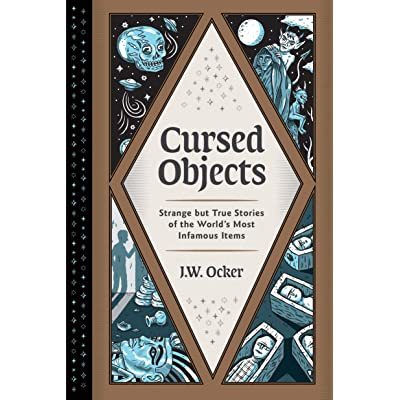
97. Cursed Objects by J. W. Ocker. This is a fun catalog of objects said to be cursed, including the whys, supposed effects and current locations of these artifacts. The book is sorted into categories, like “cursed objects in museums”, “cursed furniture”, “technological cursed objects”. It takes a skeptical, folkloric look at the topic, being more interested in the stories than in any legit supernatural powers. It even talks about things that “should” be cursed because of their odd appearances or eerie provenances, but aren’t, like the Crystal Skull forgeries. The book is a pleasant and breezy read, and the author has a good sense of humor on the topic. He curses the book itself with an epigram against thieves, and buys a cursed dog statue on eBay that sat on his desk throughout the writing process.
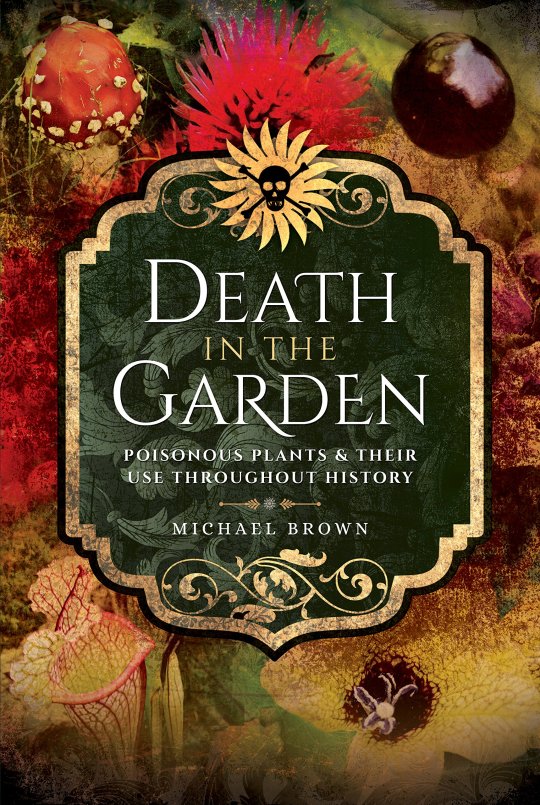
98. Death in the Garden by Michael Brown. This book is wildly misnamed, being light on both the “garden” and the “death”. It’s supposedly a social history of poisonous plants, but is more interested in English herbals specifically. It refers to the authors by name extensively as if we should have all of these memorized, and the only place where the prose has any energy is in the biographical section for these herbalists. There’s very little information about the actual plants and their poisons. I would use the word “doddering” to describe the prose style, which is simultaneously rambling and boring. The photography is pretty, though.
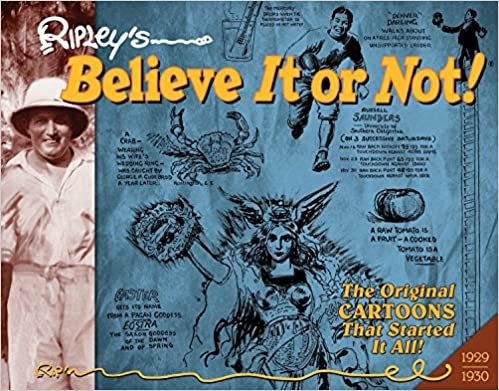
99. Ripley’s Believe it Or Not! 1929-1930 by Robert Ripley. IDW puts out lovely volumes of vintage American comics, and this is no exception. Being a kid into weird facts and trivia, and an adult who is still into them, the Ripley franchise was a major part of my childhood. This is the first modern collection organized chronologically, covering the first two years the strip was in national syndication. The strips cover the typical Ripley mix of sports trivia, weird facts, word riddles and puzzles, misleading statements and the occasional outright lie. The book has a warning about the racial attitudes of the time, which is fair, but it’s not nearly as bad as I feared. Ripley’s habit of drawing from photographic references means that people in ethnic minorities look like real people. But the language is decidedly “of its time”, with slurs used to identify foreign ethnicities (particularly Asian ones). So be warned.

100. Unlucky Stiffs: New Tales of the Weirdly Departed by Cynthia Ceilan. I’m ordering material to pick up from my local library again, which is great! This book was actually recommended by the library website based on the morbid slant of some of the other books I was putting on hold. Unfortunately, this book sucks. It’s pitched as a “weird deaths” book, something like a more literary version of the Darwin Awards. But the deaths are often not all that bizarre, instead being typically sad accidents or murders. It just comes off as mean spirited and misanthropic. Not recommended.
58 notes
·
View notes
Text
March 17, 2021: Darby O’Gill and the Little People (Review)
This is a delightful movie, and WAY better than anticipated!

I mean it, I had a really good time with this movie. And I’m hoping that there are more folklore-based movies coming up, because I genuinely enjoy them! But as for this particular movie, I’m a sucker for some good Irish stories, what can I say? If anybody has any suggestions for more of these, PLEASE send them my way, because I love ‘em.
But OK, let’s get into my thoughts in full, huh? Recap can be found here and here! On to the Review!
Review
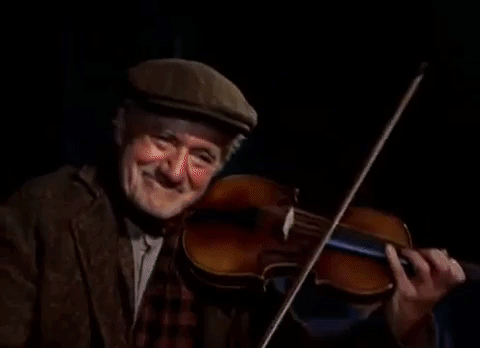
Cast and Acting: 8/10
Man oh man, do I love Albert Sharpe and Jimmy O’Dea in this movie! The two actors, both of whom are Irish, nail their roles, and I honestly love them both for it. Their interactions are a lot of fun throughout the movie, and they make both Darby and Brian fun characters to watch bounce off of each other. As for the rest, they’re...mostly good. The interesting thing, though, is the fact that of the main cast outside of those two, only Kieron Moore is Irish. Yeah, Janet Munro is English, as is Estelle Winwood, and Sean Connery is...well, Sean Connery. Any oddly enough, their roles in the film feel way more generic, and less authentic to the environment of the movie. To be specific, the film feels more Disney and less cultural when they’re on screen. Part of that is almost certainly the scenes that they’re given, but I can’t help but feel like there would be more to those scenes if they were cast more authentically. Also...Sean Connery is Sean Connery. Yeah, he’s basically just Sean Connery, BEFORE James Bond, even!

Plot and Writing: 8/10
I love the plot of this story, which takes quite a bit from Irish folklore. Of course, that’s the idea, as Walt Disney collaborated with the Irish Folklore Commission for years to make this movie, and bought in a lot of Irish influence in developing it. He traveled to Ireland on a few occasions, and even spent extended time at the Dublin Library just doing research in developing it. And it shows! The movie itself is based on a book by H.T. Kavanaugh, and further adapted by Lawrence Edward Watkin, with help from Disney. It’s a good script, and a...mostly well-paced story. Bringing in the Banshee and the Death Coach as late as they did was...not well-done. Sorry, that’s just truth. They should’ve been at least foreshadowed or mentioned early in the film, but they both pop up really late in the game. Also, the horse’s identity as a pooka is...just sort of dropped on us? I dunno, some writing could’ve been improved. And that isn’t counting the sometimes corny, DIsney-esque writing. But, as said, it is a Disney movie.

Directing and Cinematography: 9/10
Robert Stevenson is one of Disney’s most hallowed directors, and responsible for three of my childhood favorites: Herbie the Love Bug, Bedknobs and Broomsticks, and, well...Mary Poppins. SO YEAH. Dude has accomplished! And it’s well-directed, very well-shot, and...very Disney. And, no, there’s nothing wrong with that. But it’s composed of a lot of stagnant shots. But, thanks to cinematographer Winton Hoch, those shots all look pretty great, too. It’s a great looking movie!

Production and Art Design: 9/10
Same thing here, as I’d love to visit this Ireland. This film really paints the countryside as idyllic and pleasant, and this is a movie that any cottagecore fan should internalize deeply. Which is ironic...since this was filmed in California. Uh oh. I DEFINITELY don’t know Ireland, because I SWEAR that I didn’t know that until typing this review. So, yeah, maybe less accurate than I thought. Still, given that fact, this is a great looking movie. Despite some...slightly dated effects.
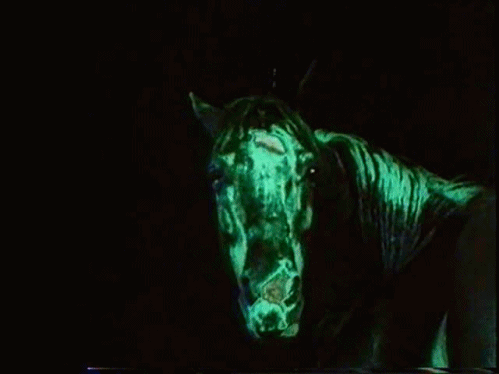
Music and Editing: 9/10
Speaking of dated effects...yeah, some of these are pretty markedly dated, like the pooka up above. However, the size-bending little people sections are AMAZING. Seriously, the effects there are VERY good, and it’s genuinely hard for me to figure some of them out. You’d think that this would be extremely easy, given that the film is 62 years old, but...no, I don’t intuitively know how they did it! It’s impressive! The editor, by the way, is Stanley Johnson, and he does a good job, all things considered. And the music! GAAAH, THE MUSIC! Oliver Wallace nails the tone of this score, and I adore this soundtrack. It’s just...good!

86% seems right, if not a little low, if I’m honest!
Roger Ebert called this movie the best Disney live-action film, which...it definitely isn’t. Sorry, nobody-but-NOBODY beats Mary Poppins for that title. Still, I do actually like this movie a LOT, and it’s up there with my favorite live-action Disney movies. I’ll have to rewatch those at some point, honestly. Maybe I’ll let you all know when I do.
But OK, let’s get back to that chronological progression of films, huh? Looks like I’m still in 1985, and...oh. It’s Woody Allen again. Topical?
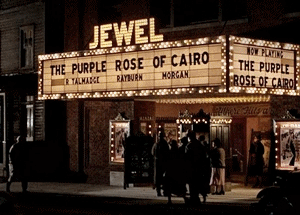
March 18: The Purple Rose of Cairo (1985)
#darby o'gill and the little people#robert stevenson#walt disney#disney#disney+#albert sharpe#janet munro#sean connery#jimmy o'dea#kieron moore#estelle winwood#leprechaun#st. patrick's day#st patricks day#st patricks 2021#fantasy march#user365#365 movie challenge#365 movies 365 days#365 Days 365 Movies#365 movies a year#365days365movies#disneyedit
9 notes
·
View notes
Text
Enola Holmes: A Not So Elementary Adaptation

It's cliché and a bit unfair to say that the book was better than the film, but I'm afraid that's precisely where I need to start. Nancy Springer's Enola Holmes: The Case of the Missing Marquess is leagues better than Netflix's adaptation of it. They did her work dirty and to say that I'm shocked at the accolades other reviewers are heaping on the film is an understatement. Before I dive into any critiques though, it's worth acknowledging that not every minute of the two hour film was painful to get through. So what worked in Enola Holmes?
The film is carried by the talent of its cast, Millie Bobby Brown being the obvious heavy-hitter. She helps breathe life into a pretty terrible script and it's only a shame her talent is wasted on such a subpar character.
The idea to have Enola continually break the fourth wall, though edging into the realm of Dora the Explorer at times—"Do you have any ideas?"— was nevertheless a fun way to keep the audience looped into her thought process. Young viewers in particular might enjoy it as a way to make them feel like a part of the action and older viewers will note the Fleabag influence.
The cinematography is, perhaps, where most of my praise lies. The rapid cuts between past and present, rewinding as Enola thinks back to some pertinent detail, visualizing the cyphers with close ups on the letter tiles—all of it gave the film an upbeat, entertaining flair that almost made up for how bloated and meandering the plot was.
We got an equally upbeat soundtrack that helped to sell the action.
The overall experience was... fine. In the way a cobbled together, candy-coated, meant to be seen on a Friday night but we watched it Wednesday and then promptly forgot about it film is fine. I doubt Enola Holmes will be winning any awards, but it was a decently entertaining romp and really, does a Netflix film need to be anything more? If Enola was her own thing made entirely by Netflix's hands I wouldn't be writing this review. As it stands though, Enola is both an adaptation and the latest addition to one of the world’s most popular franchises. That's where the film fails: not as a fun diversion to take your mind off Covid-19, but as an adaptation of Springer's work and as a Sherlock Holmes story.
In short, Enola Holmes, though pretty to look at and entertaining in a predictable manner, still fails in five crucial areas:
1. Mycroft is Now a Mustache-Twirling Villain and Sherlock is No Longer Sherlock Holmes
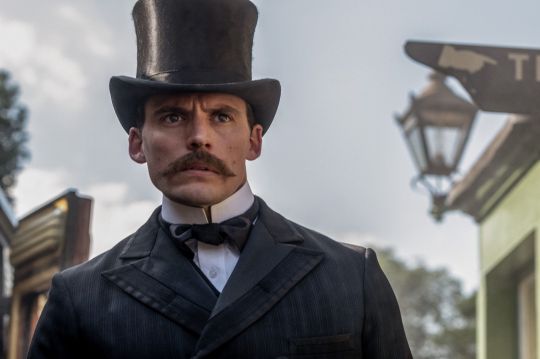
This aspect is the least egregious because admittedly the film didn't pull this version of Mycroft out of thin air. As the head of the household he is indeed Enola's primary antagonist (outside of some kidnappers) and though he insists that he's doing all this for Enola's own good, he does get downright cruel at times:
He rolled his eyes. “Just like her mother,” he declared to the ceiling, and then he fixed upon me a stare so martyred, so condescending, that I froze rigid. In tones of sweetest reason he told me, “Enola, legally I hold complete charge over both your mother and you. I can, if I wish, lock you in your room until you become sensible, or take whatever other measures are necessary in order to achieve that desired result... You will do as I say" (Springer 69).
Mycroft's part is clear. He's the white, rich, powerful, able-bodied man who benefits from society's structure and thus would never think to change it. He does legally have charge over both Enola and Eudoria. He can do whatever he pleases to make them "sensible"... and that right there is the horror of it. Mycroft is a law-abiding man whose antagonism stems from doing precisely what he's allowed to do in a broken world. There are certainly elements of this in the Netflix adaptation, but that antagonism becomes so exaggerated that it's nearly laughable. Enola's governess (appointed by Mycroft) slaps her across the face the moment she speaks up. Mycroft screams at her in a carriage until she's cowering against the window. He takes her and throws her into a boarding school where everything is bleak and all the women dutifully follow instructions like hypnotized dolls. Enola Holmes ensures that we've lost all of Springer's nuance, notably the criticism of otherwise decent people who fall into the trap of doing the "right" (read: expected) thing. Despite her desire for freedom, in the novel Enola quickly realizes that she is not immune to society's standards:
"I thought he was younger.” Much younger, in his curled tresses and storybook suit. Twelve! Why, the boy should be wearing a sturdy woollen jacket and knickers, an Eton collar with a tie, and a decent manly haircut—
Thoughts, I realised, all too similar to those of my brother Sherlock upon meeting me (113-14).
She is precisely like her brothers, judging a boy for not looking and acting enough like a man just as they judged her for not looking and acting enough like a lady. The difference is that Enola has chaffed enough against those expectations to realize when she's falling prey to them, but the sympathetic link to her brothers remains. In the film, however, the conflict is no longer driven by fallible people doing what they think is best. Rather, it's made clear (in no uncertain terms) that these are just objectively bad people. Only villains hit someone like that. Only villains will scream at the top of their lungs until a young girl cries. Only villains roll their eyes at women's rights (a subplot that never existed in the novel). Springer writes Mycroft as a person, Netflix writes him as a cartoon, and the result is the loss of a nuanced message about what it means to enact change in a complicated world.
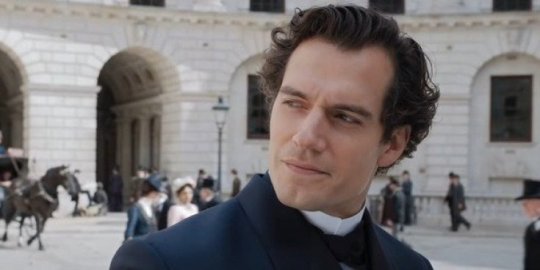
Which leaves us with Sherlock. Note that in the above passage he is the one who casts harsh judgement on Enola's outfit. Originally Mycroft took an interest in making Enola "sensible" and Sherlock— in true Holmes fashion—straddles a fine line between comfort and insult:
"Mycroft,” Sherlock intervened, “the girl's head, you'll observe, is rather small in proportion to her remarkably tall body. Let her alone. There is no use confusing and upsetting her when you'll find out for yourself soon enough'" (38).
***
"Could mean that she left impulsively and in haste, or it could reflect the innate untidiness of a woman's mind,” interrupted Sherlock. “Of what use is reason when it comes to the dealings of a woman, and very likely one in her dotage?" (43).
A large part of Enola's drive stems from proving to Sherlock, the world, and even herself that a small head does not mean lack of intelligence. His insults, couched in a misguided attempt to sooth, is what makes Sherlock a complex character and his broader sexism is what makes him a flawed character, not Superman in a tweed suit. Yet in the film Mycroft becomes the villain and Sherlock is his good brother foil. Rather than needing to acknowledge that Enola has a knack for deduction by reading the excellent questions she's asked about the case—because why give your characters any development?—he already adores and has complete faith in her, laughing that he too likes to draw caricatures to think. By the tree Sherlock remanences fondly about Enola's childhood where she demonstrated appropriately quirky preferences for a genius, things like not wearing trousers and keeping a pinecone for a pet. They have a clear connection that Mycroft could never understand, one based both in deduction and, it seems, being a halfway decent human being. We are told that Enola has Sherlock's wits, but poor Mycroft lucked out, despite the fact that up until this point the film has done nothing to demonstrate this supposed intelligence. (To say nothing of how canonically Mycroft's intellect rivals his brother's.) Enola falls to her knees and begs for Sherlock's help, saying that "For [Mycroft] I'm a nuisance, to you—" implying that they have a deep bond despite not having seen one another since Enola was a toddler. Indeed, at one point Enola challenges Lestrade to a Sherlock quiz filled with information presumably not found in the newspaper clippings she's saved of him, which begs the question of how she knows her brother so well when she hasn't seen him in a decade and he, in turn, walked right by her with no recognition. Truthfully, Lestrade should know Sherlock better. Through all this the sibling bond is used as a heavy-handed insistence that Enola is Sherlock's protégé, him leaving her with the advice that "Those kinds of mysteries are always the best to unpick” and straight up asking at one point if she’s solved the case. The plot has Enola gearing up to outwit her genius brother, which did not happen in the novel and is precisely why I loved it. Enola isn't out to be a master of deduction in her teens, she's a finder of lost people who uses a similar, but ultimately unique set of skills. She does things Sherlock can't because she is isn't Sherlock. They're not in competition, they're peers, yet the film fails to understand that, using Sherlock's good brother bonding to emphasize Enola's place as his protégé turned superior. He exists, peppered throughout the film, so that she can surpass him in the end.
You know what happens in the novel? Sherlock walks away from her, dismissive, and that's that.
That's also Sherlock Holmes. I won't bore you with complaints about Cavill being too handsome and Claflin being too thin for their respective parts, but I will draw the line at complete character assassination. Part of Sherlock's charm is that he's far more compassionate than he first appears, but that doesn't mean he would, at the drop of a telegram, become a doting older brother to a sister of all things. Despite the absurdity of the Doyle Estate's lawsuit against Netflix for making Sherlock an emotional man who respects women... they're right that this isn't their character. Oh, Sherlock is emotive, but it's in the form of excited exclamations over clues, or the occasional warm word towards Watson—someone he has known and lived with for many years. Sherlock respects women, though it's through those societal expectations. He'll offer them a seat, an ear, a handkerchief if they need one, and always the promise of help, but he then dismisses them with, "The fairer sex is your department, Watson." Springer successfully wrote Sherlock Holmes with a little sister, a man who will bark out a laugh at her caricature but still leave her to Mycroft's whims because he has his own life to tend to. This is a man who insists that the mind of a woman is inscrutable and thus must grapple with his shock at Enola's ability to cover the "salient points" of the case (58). Cavill's Sherlock is no Sherlock at all and though there's nothing wrong with updating a character for a modern audience (see: Elementary), I do question why Netflix strayed so far from Springer's work. The novel is, after all, their blueprint. She already managed the difficult task of writing an in-character Sherlock Holmes who remains approachable to both a modern audience and Enola herself, yet for some reason Netflix tossed that work aside.
2. Enola is "Special,” Not At All Like Other Girls
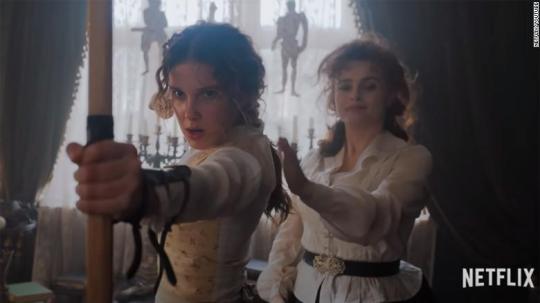
Allow me to paint you a picture. Enola Holmes is an empathetic, fourteen-year-old girl who, while bright, does not possess an intelligence worthy of note. No one is gasping as she deduces seemingly impossible things from the age of four, or admiring her knowledge of some obscure, appropriately impressive topic. Rather, Enola is a fairly normal girl with an abnormal upbringing, characterized by her patience and willingness to work. Deciphering the many hiding places where her mother stashed cash takes her weeks, requiring that Enola work through the night in secrecy while maintaining appearances during the day. She manages to hatch a plan of escape that demonstrates the thought she's put into it without testing the reader's suspension of disbelief. More than that, she uses the feminine tools at her disposal to give herself an edge: hiding her face behind a widow's veil and storing luggage in the bustle of her dress. Upon achieving freedom, her understanding of another lonely boy leads her to try and help him, resulting in a dangerous kidnapping wherein Enola acts as most fourteen-year-olds would, scared out of her mind with a few moments of bravery born of pure survival instinct. She and Tewksbury escape together, as friends, before Enola sets out on becoming the first scientific perditorian, a finder of lost people.
Sadly, this new Enola shares little resemblance with her novel counterpart. What Netflix seemingly fails to understand is that giving a character flaws makes them relatable and that someone who looks more like us is someone we can connect with. This Enola, simply put, is extraordinary. She's read all the books in the library, knows science, tennis, painting, archery, and a deadly form of Jujitsu (more on that below). In the novel Enola bemoans that she was never particularly good at cyphers and now must improve if she has any hope of reading what her mother left her. In the film she simply knows the answers, near instantaneously. Enola masters her travels, her disguises, and her deductions, all with barely a hitch. Though Enola doesn't have impressive detective skills yet, her memory is apparently photographic, allowing her to look back on a single glance into a room, years ago, and untangle precisely what her mother was planning. It's a BBC Sherlock-esque form of 'deduction' wherein there's no real thought involved, just an innate ability to recall a newspaper across the room with perfect clarity. The one thing Enola can't do well is ride a bike which, considering that in the novel she quite enjoys the activity, feels like a tacked on "flaw" that the film never has to have her grapple with.
More than simply expanding upon her skillset—because let’s be real, it’s not like Sherlock himself doesn’t have an impressive list of accomplishments. Even if Enola’s feelings of inadequacy are part of the point Springer was working to make—the film changes the core of her personality. I cannot stress enough that Enola is a sheltered fourteen-year-old who is devastated by the disappearance of her mother and terrified by the new world she's entered. That fear, uncertainty, and the numerous mistakes that come out of it is what allowed me to connect with Enola and go, "Yeah. I can see myself in her." Meanwhile, this new Enola is overwhelmingly confident, to the point where I felt like I was watching a child's fantasy of a strong woman rather than one who actually demonstrates strength by overcoming challenges. For example, contrast her meeting with Sherlock and Mycroft on the train platform with what we got in the film:
"And to my annoyance, I found myself trembling as I hopped off my bicycle. A strip of lace from my pantalets, confounded flimsy things, caught on the chain, tore loose, and dangled over my left boot.
Trying to tuck it up, I dropped my shawl.
This would not do. Taking a deep breath, leaving my shawl on my bicycle and my bicycle leaning against the station wall, I straightened and approached the two Londoners, not quite succeeding in holding my head high" (31-32).
***
"Well, if they did not desire the pleasure of my conversation, it was a good thing, as I stood mute and stupid... 'I don't know where she's gone,' I said, and to my own surprise—for I had not wept until that moment—I burst into tears" (34).
I'd ask where this frightened, fumbling Enola has gone, but it's clear that she never existed in the script to begin with. The film is chock-full of her being, to be frank, a badass. She gleefully beats up the bad guys in perfect form, no, "I froze, cowering, like a rabbit in a thicket" (164). This Enola always gets the last word in and never falters in her confident demeanor, no, "I wish I could say I swept with cold dignity out of the room, but the truth is, I tripped over my skirt and stumbled up the stairs" (70). Enola is the one, special girl in an entire school who can see how rigid and horrible these social expectations are, straining against them while all her lesser peers roll their eyes. That's how she's characterized: as "special," right from the get-go, and that eliminates any growth she might have experienced over the course of the film. More than that, it feels like a slap in the face to Springer's otherwise likeable, well-rounded character.
3. A Focus on Hollywood Action and Those Strong Female Characters
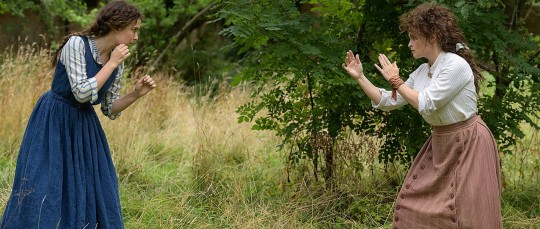
It never fails to amaze me how often Sherlock Holmes adaptations fail to remember that he is, at his core, an intellectual. Sure, there's the occasional story where Sherlock puts his boxing or singlestick skills to good use, and he did survive his encounter with Moriarty thanks to his own martial arts, but these moments are rarities across the canon. Pick up any Sherlock Holmes story, open to a random page, and you will find him sitting fireside to mule over a case, donning a disguise to observe the suspects, or combing through his many papers to find that one, necessary scrap of information. Sherlock Holmes is about deduction, a series of observations and conclusions based on logic. He's not an action hero. Nor is Enola, yet Netflix seems to be under the impression that no audience can survive a two hour film without something exploding.
I'd like to present a concise list of things that happened in the film that were, in my opinion, unnecessary:
Enola and Tewksbury throw themselves out of a moving train to miraculously land unharmed on the grass below.
Enola uses the science knowledge her mother gave her to ignite a whole room of gunpowder and explosives, resulting in a spectacle that somehow doesn't kill her pursuer.
Enola engages in a long shootout with her attacker, Tewksbury takes a shot straight to the chest, but survives because of a breastplate he only had a few seconds to put on and hide beneath his shirt. Then Enola succeeds in killing Burn Gorman's slimy character.
Enola beats up her attackers many, many times.
This right here is the worst change to her character. Enola is, plainly put, a "strong woman." Literally. She was trained from a young age to kick ass and now that's precisely what she'll do. Gone is the unprepared but brave girl who heads out onto the dangerous London streets in the hope of helping her mother and a young boy. What does this Enola have to fear? There's only one martial arts move she hasn't mastered yet and, don't worry, she gets it by the end of the film. Enola suffers from the Hollywood belief that strong women are defined solely as physically capable women and though there's nothing wrong with that on the surface, the archetype has become so prevalent that any deviation is seen as too weak—too princess-y—to be considered feminist. If you're not kicking ass and taking names then you can only be passive, right? Stuck in a tower somewhere and awaiting your prince. But what about me? I have no ability to flip someone over my shoulder and throw them into a wall. What about pacifists? What about the disabled? By continually claiming that this is what a "strong" woman looks like you eliminate a huge number of women from this pool. The women we are meant to uphold in this film—Enola, her Mother, and her Mother's friend from the teahouse—are all fighters of the physical variety, whereas the bad women like Mrs. Harris and her pupils are too cultured for self-defense. They're too feminine to be feminist. But feminism isn't about your ability to throw a punch. Enola's success now derives from being the most talented and the most violent in the room, rather than the most determined, smart, and empathetic. She threatens people and lunges at them, reminding others that she's perfectly capable of tying up a guy is she so chooses because "I know Jujitsu." Enola possesses a power that is just as fantastical as kissing a frog into a prince. In sixteen short years she has achieved what no real life woman ever will: the ability to go wherever she pleases and do whatever she wants without the threat of violence. Because Enola is the violence. While her attacker is attempting to drown her with somewhat horrific realism, Enola takes the time to wink at the audience before rearing back and bloodying his nose. After all, why would you think she was in any danger? Masters of Jujitsu with an uncanny ability to dodge bullets don't have anything to fear... unlike every woman watching this film.

It's certainly some kind of wish fulfillment, a fantasy to indulge in, but I personally preferred the original Enola who never had any Hollywood skills at her disposal yet still managed to come out on top. That's a character I can see myself in and want to see myself in given that the concept of non-violent strength is continually pushed to the wayside. Not to mention... that's a Sherlock Holmes story. Coming out on top through intellect and bravery alone is the entire point of the genre, so why Netflix felt the need to turn Enola into an action hero is beyond me.
4. Aging Up the Protagonists (and Giving Them an Eye-Rolling Romance)
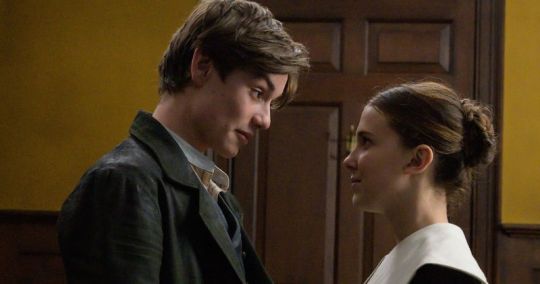
The choice to age up our heroes is, arguably, the worst decision here. In the original novel Enola has just turned fourteen and Tewksbury is a child, twelve-years-old, though he looks even younger. It's a story for a younger audience staring appropriately young heroes, with the protagonists' status as children crucial to one of the overarching themes of the story: what does it really mean to strike out on your own and when are you ready for it? Adding two years to Enola's age is something I'm perfectly fine with. After all, the difference between fourteen and sixteen isn't that great and Brown herself is sixteen until February of 2021, so why not aim for realism and make her character the same? That's all reasonable and this is, indeed, an adaptation. No need to adhere to every detail of the text. What puzzles me though is why in the world they would take a terrified, sassy, compassionate twelve-year-old and turn him into a bumbling seventeen-year-old instead?
Ah yes. The romance.
In the same way that I fail to understand the assumption that a film needs over-the-top action to be entertaining, I likewise fail to understand the assumption that it needs a romance—and a heterosexual one to boot. There's something incredibly discomforting in watching a film that so loudly proclaim itself as feminist, yet it takes the strong friendship between two children and turns it into an incredibly awkward, hetero True Love story. Remember when Enola loudly proclaims that she doesn't want a husband? The film didn't, because an hour later she's stroking her hand over Tewksbury's while twirling her hair. Which isn't to say that women can't fall in love, or change their minds, just that it's disheartening to see a supposedly feminist film so completely fall into one of the biggest expectations for women, even today. Forget Enola running up to men and paying them for their clothes as an expression of freedom, is anyone going to acknowledge that narratively she’s still stuck living the life the men around her want? Find yourself a husband, Enola. The heavy implication is she did, just with Jujitsu rather than embroidery. Different method, same message, and that’s incredibly frustrating when this didn’t exist in the original story. “It's about freedom!” the film insists. So why didn't you give Enola the freedom to have a platonic adventure?
It's not even a good romance. Rather painful, really. When Tewksbury, after meeting her just once before, passionately says "I don't want to leave you, Enola" because her company is apparently more important than him staying alive, I literally laughed out loud. It's ridiculous and it's ridiculously precisely because it was shoe-horned into a story that didn't need it. More than simply saddling Enola with a bland love interest though, this leads to a number of unfortunate changes in the story's plot, both unnecessary additions and disappointing exclusions. Enola no longer meets Tewksbury after they've both been kidnapped (him for ransom and her for snooping into his case), but rather watches him cut himself out of a carpetbag on the train. I hope I don't have to explain which of these scenarios is more likely and, thus, more satisfying. Meeting Tewksbury on the train means that Enola gets to have a nighttime chat with him about precisely why he ran away. Thus, when she goes to his estate she no longer needs to deduce his hiding spot based on her own desires to have a place of her own, she just needs to recall that a very big branch nearly fell on him and behold, there that branch is. (The fact that the branch is a would-be murder weapon makes its convenient placement all the more eye-rolling.) Rather than involving herself in the case out of empathy for the family, Enola loudly proclaims that she wants nothing to do with Tewksbury and only reluctantly gets involved when it's clear his life is on the line. And that right there is another issue. In the novel there is no murderous plot in an attempt to keep reform bills from passing. Tewksbury is a child who, like Enola, ran away and quickly discovers that life with an overbearing mother isn't so bad when you've experienced London's dangerous streets. That's the emotional blow: Enola has no mother to go home to anymore and must press out onto those streets whether she's ready for it or not.
Perhaps the only redeeming change is giving Tewksbury an interest in flowers instead of ships. Regardless of how overly simplistic the feminist message is, it is a nice touch to give the guy a traditionally feminine hobby while Enola sharpens her knife. The fact that Enola learned that from her mother and Tewksbury learned botany from his father feels like a nudge at a far better film than Enola Holmes managed to be. For every shining moment of insight—the constraints of gendered hobbies, a black working class woman informing Sherlock that he can never understand what it means to lack power—the film gives us twenty minutes worth of frustrating stupidity. Such as how Enola doesn't seem to conceive of escaping from boarding school until Tewksbury appears to rescue her. She then proceeds to get carried around in a basket for a few minutes before going out the window... which she could have done on her own at any point, locked doors or no. But it seems that narrative consistency isn't worth more than Enola (somehow) leaving a caricature of Mrs. Harris and Mycroft behind. The film is clearly trying to promote a "Rah, rah, go, women, go!" message, but fails to understand that having Enola find a way out of the school herself would be more emotionally fulfilling than having her send a generic 'You're mean' message after the two men in her life—Sherlock and Tewksbury—remind her that she can, in fact, take action.
Which brings me to my biggest criticism and what I would argue is the film's greatest flaw. Reviewers and fans alike are hailing Enola Holmes as a feminist masterpiece and yes, to a certain extent it is. Feminist, that is, not a masterpiece. (5) But it's a hollow feminism. A fantasy feminism. A simple, exaggerated feminism that came out of a Feminism 101 PowerPoint. To quote Sherlock, let's review the salient points:
A woman cannot be the star of her own film without having a male love interest, even if this goes against everything the original novel stood for.
A feminist woman cannot also be selfish. Instead she must have a selfless drive to change the world with bombs.
The best kind of women are those who reject femininity as much as they can. They will wear boy's clothes whenever possible and snub their nose at something as useless as embroidery. Any woman who enjoys such skills or desires to become lady-like just hasn't realized the sort of prison she's in yet.
The best women also embody other masculine traits, like being able to take down men twice their size. Passive women will titter behind their hands. Active women will kick you in the balls. If you really want to be a strong woman, learn how to throw a decent punch.
Women are, above all, superior to men.
Yes, yes, I joke about it just as much as the next woman, but seeing it played fairly straight was a bit of an uncomfortable experience, even more-so during a gender revolution where stories like this leave trans, nonbinary, and genderqueer viewers out of the ideological loop. Enola goes on and on about what a "useless boy" Tewksbury is (though of course she must still be attracted to him) and her mother's teachings are filled with lessons about not listening to men. As established, Mycroft—and Lestrade—are the simplistically evil men Enola must circumvent, whereas Sherlock exists for her to gain victory over: "How did your sister get there first?" Enola supposedly has a strength that Tewksbury lacks— he's just "foolish"—and she shouts out such cringe-worthy lines as, "You're a man when I tell you you're a man!"
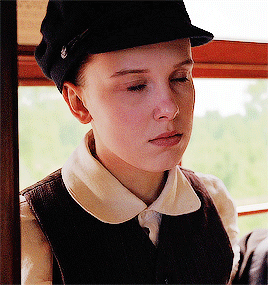
I get the message, I really do. As a teenager I probably would have loved it, but now I have to ask: aren't we past the image of men-hating feminists? Granted, the film never goes quite that far, but it gets close. We’ve got one woman who is ready to start blowing things up to achieve equality and another who revels in looking down on the men in her life. That’s been the framing for years, that feminists are cruel, dangerous people and Tewksbury making heart-eyes at Enola doesn’t instantly fix the echoes of that. There's a certain amount of justification for both characterizations—we have reached points in history where peaceful protests are no longer enough and Tewksbury is indeed a fool at times—but that nuance is entirely lost among the film's overall message of "Women rule, men drool." It feels like there’s a smart film hidden somewhere between the grandmother murdering to keep the status quo and Enola’s mother bombing for change, that balance existing in Enola herself who does the most for women by protecting Tewkesbury... but Enola Holmes is too busy juggling all the different films it wants to be to really hit on that message. It certainly doesn’t have time to say anything worthwhile about the fight it’s using as a backdrop. Enola gasps that "Mycroft is right. You are dangerous" when she finds her mother's bombs, but does she ever grapple with whether she supports violence on a large scale in the name of creating a better world? Does she work through this sudden revelation that she agrees with Mycroft about something crucial? Of course not. Enola just hugs her mom, asks Sherlock not to go after her, and the film leaves it at that.
The takeaway is less one of empowerment and more, ironically, of restriction. You can fight, but only via bombs and punches. It's okay to be a woman, provided you don't like too many feminine things. You can save the day, so long as there's a man at your side poised to marry you in the future. I felt like I was watching a pre-2000s script where "equality" means embracing the idea that you're "not like other girls" so that men will finally take you seriously. Because then you don't really feel like a woman to them anymore, do you? You're a martial arts loving, trouser-wearing, loud and brilliant individual who just happens to have long hair. You’re unique and, therefore, worthy of attention, unlike all those other girls.

That's some women's experiences, but far from all, and crucially I don't think this is the woman that Springer wrote in her novel.
The Case of the Missing Marquess is a feminist book. It gives us a flawed, brave, intelligent woman who sets out to help people and achieves just that, mostly through her own strength, but also with some help from the young boy she befriends. Her brothers are privileged, misguided men who she nevertheless cares for deeply and her mother finally puts herself first, leaving Enola to go and live with the Romani people. Everyone in Springer's book feels human, the women especially. Enola gets to tremble her way through scary decisions while still remaining brave. Her mother gets to be selfish while still remaining loving. They're far more than just women blessed with extraordinary talents who will take what they want by force. Springer's women? They don't have that Hollywood glamour. They're pretty ordinary, actually, despite the surface quirks. They’re like us and thus they must make use of what tools they have in order to change their own situations as well as the world. The fact that they still succeed feels very feminist to me, far more-so than granting your character the ability to flip a man into the ground and calling it a day.
Know that I watched Enola Holmes with a friend over Netflix Party and the repeated comment from us both was, "I'd rather be watching The Great Mouse Detective." Enola Holmes is by no means a horrible film. It has beauty, comedy, and a whole lot of heart, but it could have been leagues better given its source material and the talent of its cast. It’s a film that tries to do too much without having a firm grasp of its own message and, as a result, becomes a film mostly about missed potential. Which leads me right back to where I began: The book is better. Go read the book.
Images
Enola Holmes
Mycroft Holmes
Sherlock Holmes
Enola and her Mother Doing Archery
Enola and her Mother Fighting
Tewkesbury and Enola
33 notes
·
View notes
Text
A Totally Unbiased, Not At All Thirsty Review of (a bootleg of) Paper Mill Playhouse’s 2001 Production of Funny Girl
First, the cons: The show itself (script, score) is terribly unbalanced. As I’ve said before, Act 1 is a great musical, and Act 2 is a great play, and therein lies the trouble. If this show were about Fanny’s rise to stardom, it would end 2/3 of the way through Act 1, but it’s not - it’s a tragic romance that briefly features the Follies. So, we should probably get that part of the show on the road to begin with, yeah? Nope. We don’t even meet Nick Arnstein until 23 minutes in, and don’t see him again for another 17 minutes after that - no wonder Act 1 is nearly an hour and a half long! The bits with her mother/neighbourhood and painfully annoying friend who’s so obviously also in love with her grind the show to a halt. The film rightfully cut most of this, but in the stage version, it drags out the runtime horribly.
But how was this production? Let’s start with the cast.
The above complaints notwithstanding, Paper Mill’s Funny Girl was the absolute best it could be, and I’m not just saying that for the most obvious of reasons (though he’s certainly one of them). Like all shows of this kind - that being a star vehicle with no real B Plot - it falls squarely on the shoulders of its lead actress, and Leslie Kritzer as Fanny Brice carried it with a comic grace that was all her own, almost enough to make one think “Barbra who?” by the time she’s even through singing “I’m the Greatest Star”.
It’s a very different interpretation, relying more on youthful optimism (sometimes a touch too youthful, I think) and insecurities about class and how to be a good wife/mother than about beauty standards in theatre or the conflict between her family vs. her career, though the latter are still very much present. Her voice is amazing, and this show is no easy sing, not just because of the belting - of which there’s plenty - but because of that particular vocal quality of the era, bringing a clear and effortless mix that can go from soft and lilting to blowing the roof off the theatre in a single phrase, which is exactly what she does at the end of “People”, my favourite song in the show. I may never listen to another version again. Overall, she was fantastic, especially for having been very early in her own career at the time. But although this show has a title character, it’s just as much a romance as a comedy, and wouldn’t have worked nearly as well if she hadn’t had fantastic chemistry with...
Robert Cuccioli as Nick Arnstein. What more can I say about this man that I haven’t already said one way or another, about literally everything else he’s done? Whenever he walks onstage, everything else disappears - except Leslie, so that’s a testament to just how special they were together. He’s had such a history at Paper Mill that he got entrance applause, and he absolutely went on to earn it. It’s hilarious to me that he needed to shake being typecast in angsty, melodramatic roles when, although he most certainly brings that aspect when needed in the second act, people need to realise: he’s actually so goddamn funny, and was the perfect romantic leading man. Like several reviewers at the time said, he was, indeed, incredibly charming and sexy, and it was very easy to see why Fanny immediately fell for him.
All of that was quite vague, so let’s look at some of my favourite moments:
When Fanny and Nick first meet, he cons her employer into paying her more by pretending to offer her more money elsewhere, and after she learns he bluffed and almost cost her a job, he says “I was willing to take that chance”. From then on, we know what kind of man he is, that he will always put himself first, and Fanny will be left to deal with the consequences, which is exactly what happens. It’s a brief moment, quickly overshadowed, but so important.
He gives her his card and says “If there’s anything I can do” and naturally, I had to laugh. It almost qualifies for the Bob Bingo.
Yes, he swings a cane at one point whilst making (unintentional) murder eyes. Don’t worry, no one dies.
She does an over-exaggerated flip into headvoice and when he laughed, my heart stopped for a second. Ditto for “I breed horses.” “What’sa matter, they can’t do it alone?” and he does that distinctive chuckle.
The restaurant scene, wherein they have their first proper date, and first... something else. Even though the little diva act Fanny pulls gave me Drowsy Chaperone flashbacks and when I realised the former influenced the latter right down to the chaise and its placement, I cringed a little.
This wasn’t the show he forgot the blue marble egg he’s supposed to give her and presets himself, but it IS the show where her scarf got caught in her headpiece and he had to remove it for her... with his teeth. In the middle of an argument. She, in character, says “Thank you” while he’s trying to disentangle it; he says “Don’t thank me yet” and then resorts to biting the threads that were still stuck. It got the biggest laugh in the show, I think.
“I meet a lot of people, Fanny, and I forget them almost as quickly as I meet them. I can’t forget you.”
Every second of “You Are Woman, I Am Man”. Every. Second. From the aggressive pointing to the arm/elbow kiss, to the physical comedy of her trying not to act nervous and falling all over the chaise, to hilariously humming a line of the song into a glass when he starts with the naughty stuff, to her running away, changing her mind, gulping down even more alcohol, then jumping on him at the end while he just lies there like “Yeah, come get it”. It was perfect. And yes, I am, as the euphemism goes, parched.
I think I’ll leave it there for now, because this post is getting long and Act 2 is a very different show. I may talk about it, I may not. But pictures are sure to follow. And none of this would’ve been possible without @elv--eyera so, thanks!
1 note
·
View note
Text
Alright, this one is long overdue for an anonymous friend who really wanted me to review The Healer. So after a short pause, here is another edition of
The Worst Movie on Netflix Right Now™
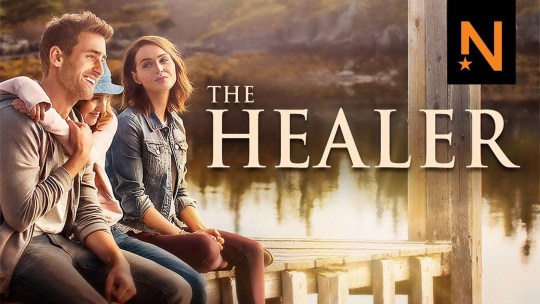
Heavy sigh.
Alright. Let’s talk about this one.
First off, I have to do some pretty serious content warnings, cause I know some people have been receiving some bad news recently and this review goes someplace you might not expect so, I love you guys, but please be aware that this review deals with: cancer, terminal illness, kids with cancer.
Now back to the bullshit.
This is basically a movie about a fucking dumbass dude who has trouble making obvious decisions.
SPOILERS AHEAD (are you new here?)
The main character Alec Bailey, begins the film as a total fuckwit. He lives in England (somewhere about) and owns a failing electronic handyman business that he calls “The Healer” (in the most pathetic stretch of narrative bullshit, but okay) and is in deep gambling debts to the Russian mob.
As our story begins, Alec discovers that he has a long lost rich uncle who makes him an offer: the uncle will pay off Alec’s debts if he agrees to live in Nova Scotia for a year. The uncle will make all the arrangements: plane ticket, work visa, place to live, etc. All Alec has to do is stay in Nova Scotia for a year.
OH NO! WHATEVER SHALL I DO?!? WHAT AM I GOING TO DO IN REMOTE NOVA SCOTIA FOR A YEAR AFTER ALL MY FINANCIAL CONCERNS ARE TAKEN CARE OF?

HOWEVER WILL I SURVIVE IN SUCH A HORRIBLE PLACE?11?!?
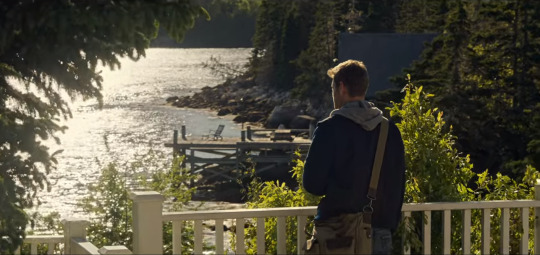
I BETTER THINK IT OVER.
*eyeroll*
He finally makes his decision after getting chased by mobsters trying to collect on his debts. ...like I said. He’s a fuckwit.
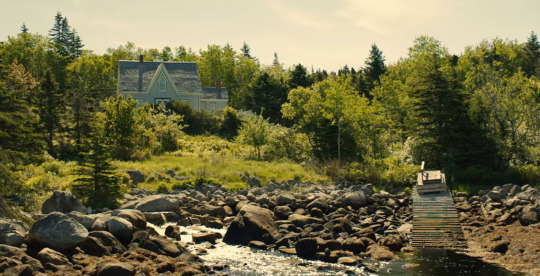
So he moves into this beautiful house in Nova Scotia. There’s no internet, which is a legit bummer, but his uncle has arranged a car for him to get to town. Seems like a pretty good gig. Even if it is going to be brutally cold come the winter months.
Well as soon as Alec arrives in town, everyone seems to know and be expecting him. He puts an ad out for his mechanical engineering services, again, under the name “The Healer.” Well........... that goes awry in ways you would expect. Suddenly, people start showing up requesting his physical healing services.
The thing is, the people from town seem to expect him to actually be a healer. They keep referring to a secret and to him being “the chosen one.” There’s no explanation for this.
Then there’s like... this whole weird interlude where Alec seems to kill the town priest, played by Jorge Ramirez (can someone please find this dude a good acting gig? my dude has decent comedic timing, he’s better than this shit). And Alec gets arrested. Even though the priest got up and walked away. All of this seems like a weird spinning of wheels before the actual plot. Like why is this happening. Why?
Eventualllllllly......... his uncle shows back up and fesses up (in the most elaborate way possible). People in his family have a gift. Every other generation, someone is chosen. And they have the gift of healing. Based solely on being near to someone who is destined to be saved.
The gift can only be activated around their 30th birthday (if this sounds unnecessarily elaborate, that’s because it is -- and I’m even cutting shit out like the secret basement and portraits on the wall, blahblahblah). The day after the birthday, the chosen one must decide. They can choose to accept or decline the gift of healing. Alec is given until midnight that night to make his decision. WILL HE BE THE CHOSEN ONE? WILL HE BE THE HEALER?!?!1?1
I mentioned that Alec is a fuckwit right?
*Hagrid voice* YOU’RE A FUCKWIT, ALEC!
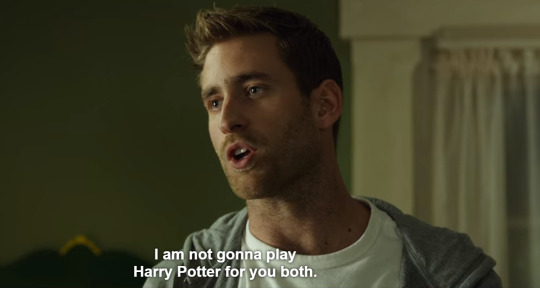
*squints*
Annnnnnyhow. Alec goes to the town church where everyone is gathered at midnight (with thank you signs and a big round of applause) and he dashes their hopes. HE WILL NOT BE THE HEALER, NO! Even though it comes with no readily apparent downsides or costs. And he’d be able to relieve the suffering of others with no cost to himself. No, fuck it. He’s going to go home.
The town takes it pretty well, all things considered. The few people who had already been healed by being near him make speeches of gratitude. They all wish him a happy birthday and tell him he’s welcome to stay. Like these people are insanely understanding about him declining the gift of healing. INSANE.
It’s worth noting that we’re about halfway through the movie at this point and we haven’t met one of the main characters of the movie.
IN COMES ABIGAIL. Cancer kid extraordinaire. She is 14 years old. Her parents have driven 7 hours to see Alec. Their daughter is dying of terminal cancer, and all they want is for Alec to spend some time with her and give it a shot. But she’s a pretty self-possessed kid. She convinces the reluctant Alec to just hangout with her for the weekend to buck up her parents and give her parents some hope. She doesn’t believe in the healing, so no harm, no foul.
And finally we’ve hit the meat of our story. Will Alec be able to save Abigail now that he’s declined the gift? Will he regret it? WHY DID HE DECLINE THE GIFT!?1?
SPOILERS (really can’t discuss this movie without them)
It turns out, Alec had a brother who died of cancer. And they were incredibly close. In Alec’s words, “he was my everything.” But now he deeply regrets giving up the gift. Now he’s worried he can’t save Abigail.

You know what, man? Same.
SO WHY THE FUCK DID YOU TURN DOWN THE GIFT!??!?
Listen. Listen, listen. I don’t know a single person who has been touched by cancer who wouldn’t jump at the chance to have a healing gift. I mean, what the fuck. Death sucks. Losing someone you love from any kind of illness sucks. Especially when it feels even remotely too soon. And cancer is a particular type of FUCKING BULLSHIT. It sucks.
So it’s really fucking hard to understand why this FUCKWIT turns down the gift to begin with. Death and suffering is not abstract for him when this movie starts! So why we should feel sorry for his resulting anxiety, now that he has met someone who is directly negatively affected by his fucking BAD DECISION.
Anyhow, the rest of the movie is basically an exercise in how charming Abigail is and how much fun we can have with her before she goes off to die. Which like......... OH-FUCKING-KAY!
It should go without saying that this movie has a happy ending. The music swells where it should. The romance is consummated. Abigail is healed. All is going to be well with the world.

As a movie, this one has some weird fucking choices. First, all of the music cues in this movie are just wrong. “Faith” by George Michael is not a song about believing in something --- unless that something is having sex with someone who hurt you before. And the lighting in this film is so beautiful all the time, it looks like you’re in a fucking ciallis commercial, even when you’re in the freaking police station, wtf?
And last, the writing is just weird in places. Like why have the love interest lie about being a lesbian through 90% of the film? Why? It’s not a good joke! And It is COMPLETELY fucking baffling to me why the good news of this story is delivered off-screen instead of on-screen. If Abigail is going to be okay, why couldn’t she come back to Nova Scotia to tell him? Why couldn’t she deliver that news in person!? That’s just bad writing. What the fuck is that?
But whatever.
On the credit side, I think Oliver Jackson Cohen knows what he’s doing as an actor. He’s not Oscar-worthy yet, but I believed him. When he talks about his brother, I felt that. And that could not have been easy in such a fucking weird script.
But as much as I’d like to end this review right here, there’s more. Cause...
..........that’s not where the movie ends. Not entirely.
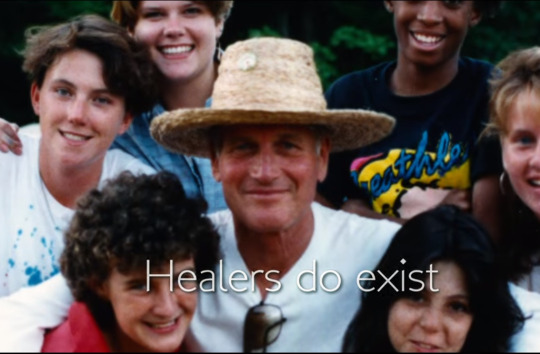
As the end music plays, the movie is dedicated to Paul Newman who established summer camps for seriously ill kids. And then we see images and videos of the kids all over the world enjoying activities at these camps.
And that’s where this critique stops. Sorta. Paul Newman was a legitimately good person. And his legacy of caring for sick kids carries on to this day, as was evident from all the footage.
But here’s the thing: healing as it’s depicted in this movie does not exist. But easing the suffering of others does. I wish this movie had been about that. I wish it had been less focused on miracles and weird family legacies and selfish fuckwits and more about the kind of healing that Paul practiced. But I guess that movie isn’t as fun, and it isn’t as hopeful and uplifting.
In the non-movie version of this story, Abigail Bryant died in 2014 at the age of 20. Her obituary still appears online. And it is still receiving comments and photos from cancer survivors and fighters, many of them who found her through the film. And they talk about how the movie touched them.
On that level, it doesn’t matter what I say here. It doesn’t matter that there are weird parts of this script or that healing like this is a fantasy. This movie does its job. It touches people. And if it inspires just a few more people to give money to help relieve suffering, then that’s all that matters.
Ronald McDonald House Charities
Cancer Research Institute
Hole in the Wall Gang (Paul Newman’s org)
Serious Fun Children’s Network (established by Paul Newman)
#ptpt reviews#the worst movie on netflix right now#i guess#sorta#cw: cancer#sorry for the long post#this one was complicated
24 notes
·
View notes
Text
The Lost World Rewrite
So, I recently watched the Lost World: Jurassic Park for the first time and all I gotta say is...

Yeah. So, in spite of the fact I feel that it would be Superfluous and self-aggrandizing, and a maturely written well thought out review would be a better use of my time, I decided to do a rewrite of the Lost World to make it a half-decent movie. I apologize to any fans of the film in advance. This is a rough Idea based on what could be done without completely throwing out the script. Here we go...
The film starts the same; little girl gets mauled by Compies on Isla Sorna
Cut to not Ian Malcolm; there is no Ian Malcolm in this film. There will never be Ian Malcolm in this film. Instead, we cut to Dr. Sarah Harding (played by Julianne Moore) who’s photographing a crocodile nesting. We learn a little bit about her from her assistant, Nick Van Owen (played by Vince Vaughn), namely that while her theories on Dinosaur young rearing are as on point as Alan Grant’s raptor research, she’s not so hot at rearing young herself. Case in point, she’s late for her daughter’s gymnastics performance.
Her daughter is of course Kelly Curtis played by Vanessa Lee Chester, who in this version will have a larger role and more developed personality. Kelly is Sarah’s adopted daughter and the two have been at a loss at what to do with one another since meeting. Kelly is the daughter of one of Sarah’s oldest friends who died while traveling and Sarah took her in. While their relationship isn’t horrible, it’s definitely awkward. Like when Sarah bursts through the gymnasium doors to see Kelly has completely finished her routine and the seat reserved for her has been given to someone else (maybe Michael Crichton or Steven Spielberg in a cameo?)
Later that night, Sarah is called by a mysterious voice on the phone, telling her to pack a suitcase and go outside. She does so and a black SUV pulls up. “Get in.” a man’s voice tells her.
“OK,” Sarah says, annoyed, “who are you people and what’s with the G-man routine?”
“I wouldn’t exactly call it a G-man routine.” says a familiar voice.
We pan over to reveal John Hammond (Richard Attenborough) sitting across from Sarah.
“Can I offer you a drink?” he asks.
The conversation is much the same as the movie with Ian Malcolm (Hammond explains Site B, tells Sarah about the JP incident, etc.). Only this time, there’s a big difference: InGen wants to cut ties with the Jurassic Park debacle and intends to let the Costa Rican Government fire bomb it. Hammond wants to get people onto the island and document the animals to drum up environmentalist support for turning it into a preserve and at least stave off the destruction until a humane solution can be found.
“How can I say no!?” Sarah says. A chance to photograph real Dinosaurs. Never in 65 million years did she think she’d get this chance.
The team she’ll be going to the island with includes herself, Hammond, Van Owen (“Nick’s the best person for the job” Sarah insists), equipment manager Eddie Carr (Richard Schiff), Dr. Robert Burke (Thomas F. Duffy) (“are we sure he’s not a country singer?” Sarah asked, eyeing the supposed paleontologist’s ten gallon hat and beard), celebrity big game hunter Roland Tembo (Pete Postlethwaite), and InGen executive Peter Ludlow, Hammond’s own nephew (“I made the mistake of trusting too many people last time,” Hammond said, “this time, I’m playing it close to the vest.”)
The team arrives on the Island, where Peter suggests setting up camp in a low clearing, much to Tembo’s chagrin (“that,” Tembo said, rolling his eyes, “is a game trail, Mr. Ludlow. Carnivores hunt on game trails. do you want to find dinosaurs or serve them lunch?”)
The group wanders through deep Jungle, Hammond and Ludlow being the slowest, one due to their age the other due to being a little on the wimpy side. As the journey goes on, it becomes apparent that there’s some friction between Peter and John, with Peter second guessing John every chance he gets and trying to act like the leader of the group.
They finally come across a family of stegosaur and we get that adorable pet the baby scene from the movie. Eddie is flabbergasted, Nick is taking pictures like crazy, Burke’s having a conniption, Hammond swells with pride, and we don’t really know what’s going through Peter and Tembo’s heads.
Something startles the Stegs (Tembo reached for his gun. “No!” Nick grabbed the barrel of Tembo’s gun.)
Nick fumed “An animal that hasn’t been seen in over a million years turns up and the only way you can express yourself is to kill it?” Tembo smiled. “Remember that chap about twenty years ago? I forget his name. Climbed Everest without any oxygen, came down nearly dead. When they asked him, they said why did you go up there to die? He said I didn't, I went up there to live.” (cryptic, no?)
“What could have set them off like that?” Wondered Burke. Roland, however, scented the air. “Smoke,” he said simply, pointing “coming from that way. They must have thought it was from a forest fire.”
The group rushes back to their camp, discovering the campfire burning. Eddie and Burke make to smother it. However, the camper door opens to reveal—
“I was gonna have dinner ready when you got back.” Kelly said.
Sarah and Kelly have an argument inside the camper, about how Sarah’s never there for her and how she just washed out of her gymnastics team (“I got bronze,” she said, “not that you’d know. You didn’t even stick around long enough for that part.”)
Kelly convinces Sarah she can stay. We cut to a scene of the group in jeeps, riding through grasslands in a heard of various Dinosaurs. Nick’s in the jeep with Tembo, Peter, and Hammond, while Sarah is with Kelly, Eddie, and Burke. (Tembo turned to Nick. “get in the outrigger. You're closing in on a parasaur.” “Parasaurolophus,” Nick corrected smugly.” “Whatever,” said Tembo, “The one with the big red horn! The pompadour! *Elvis!*”)
Nick climbs into the outrigger and begins to film the dinosaurs. In the other jeep, the group is trying to coax Eddie into their own outrigger.
“No way I’m getting into that thing,” Eddie said “not surrounded by dinosaurs.” “We’re gonna need better shots if we want to save these dinosaurs,” Sarah said, “and you’re the only one who knows how to work the equipment.” “So do you,” Eddie said, “Why not pull over and let me drive? I used to drive cabs for a living.” “I know how the use the camera.” Kelly said. Sarah stared at her. “You do?” “I was in AV club before gymnastics.”
The group snaps Kelly in and they begin their own filming process. For the first time in a long time, Kelly and Sarah seem to be having fun together.
After that moment of chipperness, we cut back to camp. (Roland nodded to Nick. “Tree hugger got a great shot of a Pachy... a pachy... oh, hell. One of those fatheads with the bald spot, Friar Tuck!”) Peter and Hammond are looking over a map. Peter insists that they should go to the abandoned worker village on the other side of the island, where they can find easy shelter and supplies (“IT runs on geothermal power, so it’ll still have power”). Hammond disagrees. (“Absolutely not,” Hammond said, “that part of the island has been overrun by Velociraptors.” Peter frowned “What’s that, veloc-o-?” “Velociraptor,” Burke said, “Carnivore, pack hunter. About two meters tall, long snout, binocular vision, strong, dextrous forearms, and killing claws on both feet.” “That doesn’t sound promising.” said Peter. “You should read Alan Grant’s latest paper on them,” said Burke, “It’s like he met one in real life!”)
Meanwhile, Roland Tembo is now kneeling, looking at a track.
“Come take a look at this.” he says. Everyone gathers around. “do you know what this is?” he asks. Sarah’s eyes grew wide. “We have to leave.” she said. “Why?” asked Kelly. “That’s a T-Rex track!” Burke said. “A T-Rex!” Eddie looked as if he was about to break for the beach and try to swim home. “That’s impossible!” said Hammond “the satellite photos showed that the Rex territory is nowhere near here.”
The group decides to risk staying in the area. Later that night, Kelly hears a noise. Curious, she goes outside to investigate. In the moonlight, she sees a team of unknown men in night vision goggles capturing the dinosaurs that they had been filming earlier that day. As the drive off, Kelly grabs onto the back of one of the trailers to follow them.
We cut back to Sarah’s tent. She’s asleep, not having been roused by her daughter’s departure. But she is roused by what sounds like deep breathing outside. She surreptitiously looks around and sees a massive snout sticking into her tent. It’s the Tyrannosaur!
Just then, Peter Ludlow comes out of his tent with a roll of toilet paper, but upon seeing the dinosaur lets out a scream that wakes the whole camp. The rex turns and bellows at him, trashing their camp all the while in a show of dominance. Soon, the whole group is running through the forest. Hammond is almost eaten by the thing if not for Tembo’s intervention.
Soon, however, the groups are separated from one another. Hammond slips down a river bank into a ravine, Peter just up and vanishes, and Sarah, Van Owen, Tembo, Burk, and Eddie run behind a waterfall with the rex in pursuit. The dinosaur, unable to follow, gives one last roar of anger and leaves. Out of all the people, however, Tembo looks the least scared. He looks…thrilled, actually.
Meanwhile, we cut away to Hammond. He rises (roughly) shaking away the delirium. He looks around, wondering where his party got off to. The T-Rex’s roar is heard in the distance. Better find the others, he thinks. He begins to follow the river; if the group has any sense, they’ll make a new camp on the water. But then he hears a noise and looks down. It’s a Compy.
We get a very similar scene to Dieter Stark’s (Peter Stormare’s) death in the movie (which was based off of John Hammond’s in the first book) with one or two caveats. First, we don’t cut away in the middle. We maintain the scene and the suspense as long as possible (with Compys popping out of the woodwork the more Hammond tries to get away from them). The second…
There was a sound of rifle fire. The Compys scattered and Hammond felt himself pulled up from the shallow water, finally able to breathe. “Tembo,” he coughed.
“If you have any more suicidal ideas,” said Tembo, “keep em to yourself.”
Cut back to Sarah’s group as Hammond and Tembo rejoin them.
“Has anyone seen Kelly?” Sarah asked, worried.
“I think I saw her run in the same direction as Ludlow,” said Tembo.
“Hopefully, they’ll be safe once they leave the Rex’s territory.” said Burke.
“Don’t bet on it,” said Sarah, “Tyrannosaurs have the second largest proportional olfactory cavity of any creature in the fossil record.” “What’s the first?” asked Eddie. “Turkey vulture,” said Burke, as casually as someone would talk about the weather.
“Any idea where we are?” asked Eddie, desperately trying the change the subject. “Somewhere west of the worker village, I think,” said Nick, examining a map of the island (one of the few they managed to salvage from the camp) “It’d be an easy hike there.” “Maybe that’s where Kelly and Peter are,” said Sarah, turning to Hammond. “Yes, but if they did go there, they’re in grave danger.” said Hammond. “Velociraptors,” said Burke, trying to be helpful.
“Danger or not, we need a radio,” said Tembo, “that buck tore the hell out of our camp and I don’t think we can contact the mainland with smoke signals.” “How do you know the T-Rex was male?” asked Sarah.
Before Tembo can answer, a different roar is heard. A helicopter passed overhead.
“I thought you said we had a few weeks before they started razing the island?” Sarah said. “We do,” Hammond replied, “I don’t know what that helicopter’s doing her.” “It was headed towards the worker village,” said Tembo, “so, if we want to see what’s what, I think that’s where we’re headed.”
Cut to a scene of the group walking through the forest at night. Finally, they reach a vantage point overlooking the worker village…and it’s anything but abandoned.
More than three dozen people, some of them armed, are walking over the compound. Chain link fence ran the perimeter of the camp, newer than the rest of the camp. Tents, vehicles, mobile generators, the works.
Dozens of dinosaurs sit in cages, all bearing the same logo
“It says InGen on the side of that truck!” Eddie said. Everyone turned to look at Hammond. “I had no idea about this,” said Hammond, “why would I ask anyone to come here?” “I think I know who we should ask,” said Nick, pointing down at the camp.
It’s Peter, down in the camp, talking with the armed guards.
“What’s he doing down there?” asked Sarah. “I think,” Hammond said, sadness in his voice, “I’ve made the same mistake twice.” “Anybody seen Tembo?” asked Eddie.
Indeed, Tembo has disappeared.
Cut to Kelly, hiding in one of the trailers. She’d managed to evade her captors, but for how long she can continue to do so is up to debate. Stealthily, she creeps out of the trailer and around the camp over to one of the cages. She undoes the latch. She moves on to the next cage. Rinse and repeat.
Cut to inside one of the tents, Peter and several other people, all InGen personnel, stand around a card table where plans labeled ‘Jurassic Park San Diego’ are lain out.
“San Diego?” One man (a high ranking InGen worker) asked. “it’s already famous for its animal attractions,” said Peter, gesturing to plans on the table, “San Diego zoo... Sea World... The San Diego Chargers.”
“I don’t think John Hammond would have approved of having these animals on the mainland.” An InGen executive said.
Peter frowned. “Well, Hammond’s not in charge anymore. I am.” He turned to another man, this one a hunter by the look of him. “How’s the hunting going?”
“We’ve got plenty of plant eaters,” the hunter said, “some eggs. no raptors though. And our man hasn’t brought in the T-Rex like he said he would.”
Peter rolled his eyes. “What makes you think people want to see a bunch of veggiesaurs and eggs! They’re gonna want a T-Rex!”
“We’re trying, sir!” the hunter says, “but we haven’t seen any raptors since we got here!”
Suddenly, a worker bursts into the tent “The baby’s gone!” he said.
Almost as suddenly, a Triceratops bursts into the tent, smashing into the table and scattering the group. The camp is in chaos! Dinosaurs are running amuck. Vehicles overturned, people tossed into the air. But this is the chance Hammond’s group has been waiting for. They make their way down to the village in the bedlam, and make it into the main building of the worker’s village. Eddie manages to contact the mainland, and things are looking up. But then, we hear an ungodly moan from behind a nearby door. Slowly, Burke heads towards the door, picking up a nearby screwdriver to use as a weapon. He jerks the door open to reveal…
“Kelly!” Sarah cried. Kelly sat inside a broom closet, in her arms a baby T-Rex.
“They just left him tied to a stick out there,” said Kelly, “and I think his leg is broken.”
Despite the limited materials, the group sets to work splinting the baby’s leg. It’s pretty much the same as in the movie. Until the sound of a rifle cocking is heard behind them.
“I’ll be taking that rex now, Dr. Harding,” Roland Tembo said. Tembo has been on Ludlow’s payroll since the beginning. He was never here to protect the group. He’s here to hunt the T-Rex. He was the one who staked the baby out, to attract it’s parents.
Outside, the cacophony has died down. The Dinosaurs have mainly been recaptured. Hammond’s group has been brought before Ludlow, who looks at them condescendingly. “You really thought you were still CEO when you got here, Uncle John? I bought you out the day you asked for my help. We’ll still use the footage you took for our attractions, don’t worry.” “So, you’re going to reopen Jurassic Park then, is that it? Despite my warnings?” “No, not reopen. We’re moving these animals to the mainland so we don’t have to fly out here every time there’s a problem. You put us six million dollars in debt every day since you started making dinosaurs. It’s time to see good on that investment you promised. And the board agrees with me.”
InGen Exec: it’s nothing personal John. Why have a dinosaur and not use it?
“These are animals,” Sarah said, “they deserve respect”
“They’ll have the best of care.”
“And what if they break out! What then?”
Cut to part of Hammond’s team (Hammond, Sarah, and Kelly) being shoved into a trailer with the door locked behind them. Sarah tries to force the door open, to no avail. Kelly runs around, trying to open the windows. Hammond just sits down, despondent at the betrayal of his own family.
Sarah (trying to yank the door open): come on! You stupid…
A familiar roar is heard. A car flips past the window.
“What is it?” Hammond asked, “What’s going on?”
Sarah: I think things just got complicated.
The buck T-Rex from earlier has tracked the them to the Worker village and crashes through the fence. Suddenly, another roar is heard from the other side of the camp. It’s the female Rex, and she’s even more pissed than the male.
“There’s two of them!?” Sarah asked, incredulous. “We spared no expense,” Hammond said.
The rexes wreck the trailer the rest of Hammond’s team is in. Nick, Eddie, and Burke make a break for it. The female Rex sees them and gives chase. She and her mate bare down on them and soon capture Eddie, each taking one end in their jaws and pulling him apart for a snack.
Afterward we get a faceoff between Roland Tembo and the male rex (one that would have been really cool in the movie but we didn’t get it).
Tembo wastes two shot gun blasts on the rex. Out of ammo, he switches to tranquilizers, which finally manage to bring the beast down. The other rex is soon felled after. Subdued in special harnasses, the rexes are air lifted by helicopters to a boat waiting of the coast of Isla Sorna. All in all, the bad guys’ mission is a success. Well, Tembo wouldn’t say so. If you’d told him a year ago he’d get to hunt not one but two T-Rexes he would have kissed whoever told him that square on the mouth. But in the end, it had been so stupidly simple to catch them he just feels crapped on. Didn’t even get a trophy.
“You know, I remember the people who've helped me, Roland. There's a job for you at the park in San Diego if you want it.” Roland turns him down.
Cut to a group of hunters patrolling the tall grass outside the worker village. Suddenly, one of them is pulled under. A hunter a few feet away looks in his direction. “Manolo?” he asks. Another nearby hunter is pulled out of view. The hunters are starting to get scared. “Look alive, people.” one of them says. We hear a familiar coughing sound.
A velociraptor jumps out of the grass and mangles one of the hunters. Soon, pandemonium ensues. The crafty raptors had been evading the InGen hunters, watching them, waiting for the right moment. And with two dinosaur attacks in a row and both rexes out of the picture, now was the time to strike! (And there are no tails sticking up out of the grass cartoonishly! Raptors are supposed to be dangerous, not goofy).
Back at the camp, Roland runs towards the danger while Peter climbs aboard one of the waiting helicopters. “Get me out of here!” he cries.
The raptors swarm the camp. Roland manages to kill a few, but not before they massacre most of the InGen workers there. Tembo even has to watch Burke die in front of him. We get a scene where Hammond’s group escapes their trailer, Kelly defeats a velociraptor with gymnastics and the group plus Tembo manages to get onboard a helicopter.
The rest of the movie follows the actual TLW movie pretty closely with a few differences. Namely, there’s more than one dinosaur rampaging through San Diego, Tembo is helping the remaining team route the dinos back to the ship, we acknowledge the fact that the car they picked in the movie was due to reasons of masculinity, and Peter suffers a nervous breakdown when the dinosaurs break out of the ship’s hold and allows himself to be eaten by the baby rex out of guilt.
Roland fires a tranquilizer shot at the buck rex before it can clear the door. When that’s done, Sarah asks him what he’s going to hunt next.
“I believe I've spent enough time in the company of death.” he said.
We cut to Kelly and Sarah asleep on the couch while a TV plays news coverage of the boat being returned to Isla Sorna with a statement from John Hammond (once again CEO of InGen).
His speech is pretty much the same, ending with “as someone once told me, life finds a way.”
The final shot of the film is the rex family, the stegosaurs, all the dinosaurs back on Isla Sorna. Content as the Jurassic Park credits theme plays in the background.
So, what did you think? Like it, hate it? As always, I welcome feedback and comments!
#Jurassic Park#The Lost World#the lost world: jurassic park#Jurassic Park 2#Jurassic Park II#Steven Spielberg#Rewrite#Re-Write#Dinosaurs#My Writing#Well Sort of#Fix It Fic#Sarah Harding#Roland Tembo#John Hammond#Kelly Curtis#Nick Van Owen
21 notes
·
View notes
Text
ALTERED STATES REVIEW TIME!
OK, this tumblr is, today, a vehicle for me to review ALTERED STATES. And you (the one person who stumbled on this review two-hundred years from n- oh who am I kidding, when the aliens from A.I. who show up to thaw out Haley Joel Osment and the teddy bear who was the real hero of that movie find this) should be very excited about this. Because this movie is insane. And highly entertaining.
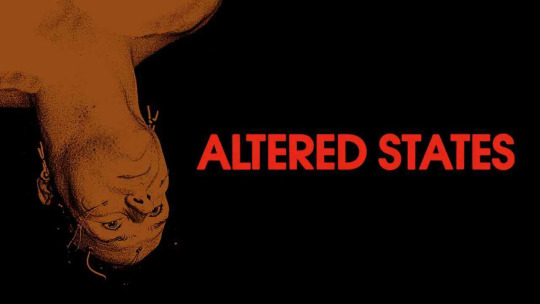
Yes, the movie poster looks like ass. If I told you this was a movie where William Hurt (not the William Hurt from that awful 90's Lost in Space remake, or the one who slept through an entire performance as Duke Leto in the Syfy miniseries of Dune. This is before the body snatchers got him) took ayahuasca and got in a isolation tank and it blew his mind so hard he started devolving into a neanderthal and creating dimensional portals and he couldn't stop because he was addicted to finding the truth of existence... Well you wouldn't get that from this poster, would you? So let's move on. Shall we?
The film opens in 1967 with William Hurt's character, psychopathologist Edward Jessup, already immersed in a sensory deprivation tank, whilst his colleague and “buddy” Bob Balaban (he's just Bob Balaban in everything I'm not giving you his character's name look it up yourself if it's bugging you so much) oversees.
Now, you may notice I put buddy in quotes. The reason for that is that Jessup is a self-obsessed ass who seemingly has no reason to be around other people unless he can expound to them one of his various monologues. Bob Balaban barely gets a word in edgewise throughout the entire film. Bob Balaban.
See, Jessup loves the sensory deprivation tank experience. Unsurprisingly, as it allows him to be completely alone with himself for hours.
Later, at perhaps the lamest party ever, a bunch of faculty are chilling out and listening to the Doors. Everyone we see is talking about Jessup. Why? Well, much as Jessup is obsessed with himself, everyone else seems to follow suit by being obsessed with him. One young woman, Emily, (Blair Brown) is introduced to him in this very shot below as he arrives at the party:
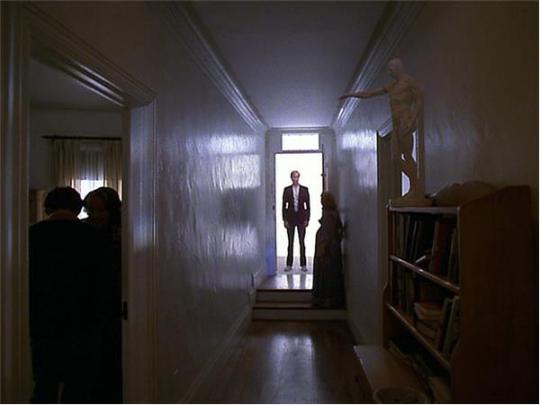
Notice how is framed in holy light? There is a closeup after, of him framed in blinding glowing light followed up with a zoom in on Emily's face, enraptured with this incredible dynamic man. So much so that the moment he tries to make a goddamn sandwich she starts grabbing his celery (get your mind out of the gutter) and flirting with him. Which for these two that means talking science, immediately. Talking more at each other than with each other. This is often the way with Paddy Chayefsky's scripts.
PAUSE
Paddy Chayefsky is doubtless one of the great American writers for the screen. He wrote Marty, The Hospital and Network (which is a fucking incredible piece of work). He got an Oscar for all three. He also wrote this movie (Altered States, remember? Good lord) and disowned it completely three weeks in to production. His scripts tend to have very intelligent, driven characters at the center, who monologue extensively at each other. These scripts are not attempting to sound naturalistic.
Ken Russell, however, directed the film. He, like Chayefsky, is top notch at what he does (Direct. I said he directed the film like a second ago, come on keep up). His films, like Women in Love, The Devils, (which was banned in several major countries upon release and has never been shown publicly in its full, uncut form (by the way it's a masterpiece)) the Who's Tommy, Gothic, and Lair of the White Worm are all fucking gonzo nuts. I mean like, when you gave this guy the reins, you were going to Overthetopsville and there will be no stops on this trip. And god bless! I love directors who GO for it!
You're getting the chance to make a movie. Stop hemming and hawing and hit me over the head with what you want to say! Film is a visual medium, USE IT!
I feel I might have made my feelings clear here. So, moving on...
Ken Russell and Paddy Chayefsky immediately started butting heads, right from the start. Chayefsky was a BIG deal, and he wanted control over the picture in a BIG way. Ken would listen to his suggestions on everything to lighting and set dressing, and politely tell him, “No.”, and continue being the director of the film. Chayefsky hated him pretty quickly.
He had much more control over films like The Hospital. Which, if you watch The Hospital, well, it shows. You've got great actors (George C. Scott, Dame Diana Rigg (Dame may be the greatest official title of all time)) saying great dialogue. But its just two very witty bitter people sort of expounding on topics and speaking at each other and suddenly admitting they are in love and discussing what drapes they will have to buy for their new home. It's utterly preposterous, and it doesn't work in the way Sidney Lumet got it to work in Network, by literally making one of the lead characters realize his life is turning into a ludicrous soap opera.
So of course Ken tried to humanize, naturalize, the dialogue sequences. And it works! The film feels more human than the Hospital or Network. Despite the fact that Jessup is literally becoming more and more inhuman throughout the film. One of the ways he does this is by having the character's eat, drink, and work on other things during the dialogue sequences. This is perfectly normal in film, it's called giving the actor “business” to do, during the scene. Chayefsky HATED this. “They are mumbling my precious dialogue! Chewing through it! Sucking it through a straw!” Sorry, Chayefsky buddy. It works for the picture. Chayefsky also felt the actors were too emotional with his dialogue. Right. See, they call that acting.
UNPAUSE
Which brings us back to the first meeting of Emily and Jessup at the party. They are eating during this important scene! I can just picture Chayefsky seeing this, and running to the studio brass to tattle and get Ken Russell fired (as he got Arthur Penn of Bonnie and Clyde fame fired before Ken Russell came on board).
Emily and Jessup are, true to Chayefsky form, extremely intelligent, driven people and hearing them discuss topics such as anthropology and schizophrenia is quite interesting. It's just that what is to come, film being a visual medium, will eclipse just about any dialogue, no matter how good, from our mind thingys.
The two give up on the science talk and go straight to banging on her couch. After, she asks what he was thinking about. His answer is priceless. “God. Jesus. Crucifixions.”
She smiles.
Bwahahaha! Oh Paddy Chayefsky, you sure know women.
He admits he used to have religious visions. She listens to him from the sweaty couch whilst he sits naked on the floor, and starts going on about his father's horrible death of cancer and his loss of faith. And he admits to her that he's a nut. Her response is to call him a fascinating bastard. I think Lucas may have taken notes for Padme and Anakin.
So naturally, they get married immediately.
But none of that matters because Jessup gets back in the sensory deprivation tank and has his first vision. A nightmare of his dying father and lost faith in christianity. It's pretty great, filled with foreboding hospital rooms, his father's face being covered in a burning Shroud of Turin, everything covered by horrible blood red clouds and then THIS FUCKING THING SHOWS UP AND ITS ALIVE AND WRIGGLING
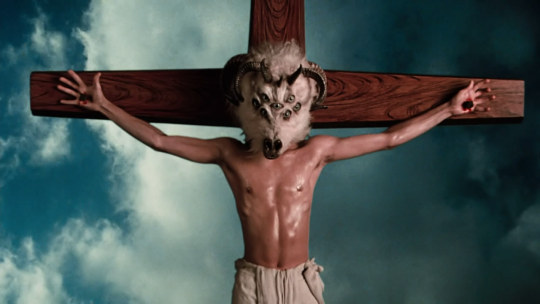
AAAAAAAAAAAAAAAAAAAAAAAHHHHHHHHHHHHHHHHH!!!!!!!!
excuse me...
AAAAAAAAAAAAAAAAAAAAAAAAAAAAAAAAHHHHHHHHH!!!!!!
The many-eyed goat is slaughtered over a gold bible and suddenly Jessups screwing Emily again and we enter a blood vessel looking thing and the vision ends and he never mentions this again. Oh. Okay,
Emily continues on about what a nut Jessup is as they make marriage plans. Her monologue:
“You're an unmitigated madman. You don't have to tell me how weird you are. I know how weird you are. I'm the girl in your bed the past two months. Even sex is a mystical experience for you. You carry on like a flagellant... Which can be very nice, but I sometimes wonder if it's me that's being made love to. I feel like I'm being harpooned by some raging monk in the act of receiving God. (Emphasis mine)
"And you are a Faust-freak Eddie! You'd sell your soul to find the great truth. Well, human life doesn't have great truths. We're born in doubt. We spend our lives persuading ourselves we're alive. And one way we do that is we love each other, like I love you. I can't imagine living without you. So let's get married, and if it turns out to be a disaster, it'll be a disaster.”
It's a disaster.
As in, by the next scene. It starts off happy enough looking, they have kids and people are smiling. And hey, wow it's seven years later! But, well, see, whoops, they are getting a divorce. Well, not they. See, he is divorcing her because he considers the seven years with her a complete waste.
She still loves him, desperately. He doesn't give a shit about her or the kids. He tells Bob Balaban this, straight up. And then starts bugging him about deprivation tanks and Hinchi Indians in South America who have sacred mushrooms that can really fuck you up.
It's at this point you would like for Jessup to be hit by a Mack truck. But the movie continues on. By the way, this is one of the kids he doesn't give a crap about:
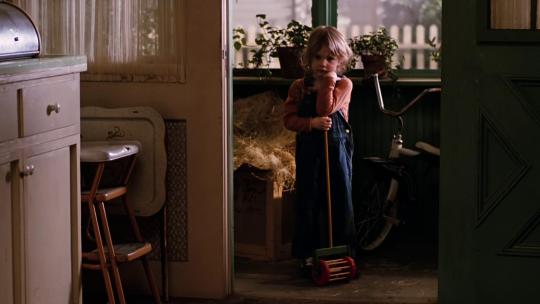
That's right. Drew Barrymore's first role is a kid that William Hurt doesn't give a shit about. Something that William Hurt would make a career out of with narcoleptic performances in Lost in Space and Syfy's Dune. So, Emily takes the kids to Africa for her anthropology work while Jessup goes to South America to go deeper into his own creepy mind.
The Hinchi Indians agree to allow him to participate in the drug ritual. They enter their holy cave.
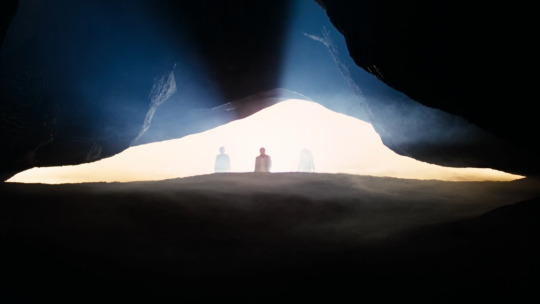
This shot is beautiful. At this point the film becomes increasingly gorgeous. Ken Russell has started to go into overdrive, ladies and gentlemen. Buckle. Your. Seatbelts.
The Indians grab Jessup's hand and cut him, freaking him out. They pour his blood into the drug mixture. They begin to drink. Then he takes a sip. The intensity of the film here has quadrupled. The vision begins, fireworks going off all around him. He sees cave paintings of humans and komodo dragons and this:
The proper life he left behind with Emily. He's convulsing, sweating. The Indians are all around, masked. Snakes. He's laughing in pain. Energy spills from the void. A snake under the parasol strikes and begins to strangle him. He and Emily march toward a nuclear explosion as energy pours from the cut on his hand, becoming a lizard. From within a sandstorm, Emily watches him, naked. Jessup looks at her, entranced, as the soothing sands cover them both, slowly.
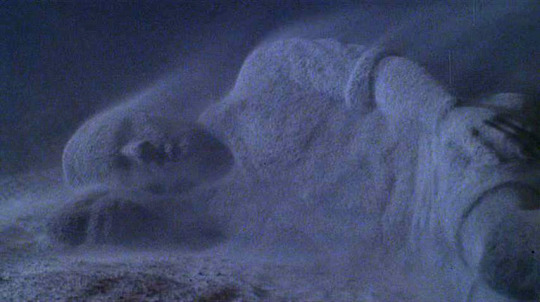
It's a beautiful sequence. A perfect film sequence. I can't overstate how strong the vision sequences are from this point forward. Great visual effects work and the madman mind of Ken Russell create something unforgettable, with it's own pace, independent from the rest of the film.
Jessup awakens with a komodo dragon laying before him, ripped to pieces. The Indians and the others all claim he killed it in rage. Jessup remembers nothing, takes samples of the drug to reproduce it, and goes back home.
Back home, Jessup keeps doing as much of the drug as he can and having Bob Balaban record results. They can't up the dosage any more so Jessup hops back in to the self deprivation tank to create a more extreme experience.
In his next session, Jessup states he is having a vision of early man, hunting a deer and killing it. Suddenly he states he is one of them, killing the deer. He begins to grunt like an animal. The two pull him out. He's incredibly pale, blood seeping out of his mouth. He can't speak, and has difficulty breathing. He insists they do an X-ray. It shows that there is a vocalizing lump in the front part of his throat. Jessup claims that his body had begun to revert to a simian state. The medical doctor agrees, stating the throat X-rays looks like that of a gorilla.
Luckily his throat returns to normal. So Jessup finishes up his day by having over a student of his and sleeping with her.
Our hero, people!
At this point we hardly feel sorry for him as his body suddenly begins to twist and bulge in the middle of the night, shifting in and out of neanderthal shapes. It's a horrific sequence, disturbing as hell. You certainly didn't expect the film to shift into body horror.
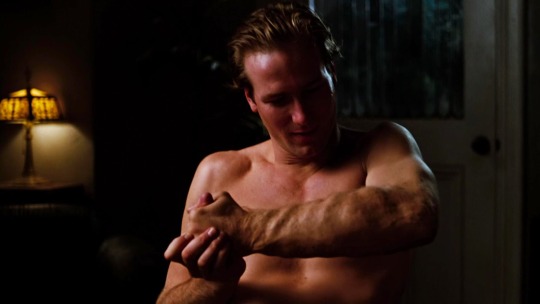
Jessup feels normal after a while. but sees visions of lava explosions, the birthing of the Earth all around him. Not a good sign.
He goes to pick up Emily from the airport the next day. She asks how he is doing.
“Oh, fine.”
Yeah right.
Emily has been told what Jessup has been doing and is worried, which of course pisses off Jessup even more. The guy is obviously obsessed with reaching the truth and root of existence, much as Emily surmised earlier, and we see he has no fear of even losing his own soul, again true to her word. The only thing that allows us to give a shit about him at this point is that Emily cares for him and she's decent people, okay?
So back Jessup goes into the tank with his ayahuasca or whatever it is. Alone. The tank door opens from the inside.
The hand that pushes it open is covered in thick hair. He's devolved.
Ape-Jessup escapes the tank room and chases a janitor around the building. Again, this scene is fucking freaky as hell. We can't get a good look at this screaming animal that was Jessup.
The janitor gets a guard to help and chases after him into the boiler room, where we finally get a good look at him when he assaults the security guard and escapes.
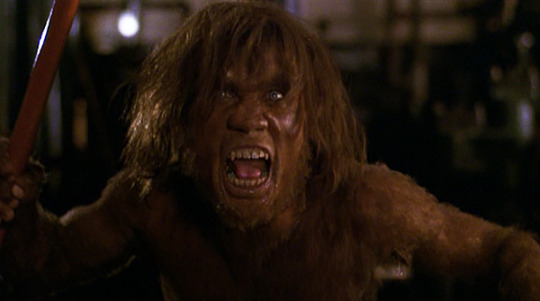
AAAAAAAAAHHHHHHHHHHHHHHHHHHH!!!!!
Ape-Jessup runs through the city at night, making his way to the zoo where he kills a antelope and eats it. The Ape-Jessup sequence goes on way too long, but is nonetheless unforgettable. The makeup is much more convincing than the above picture suggests, and whoever performed Ape-Jessup did an admirable job.
The cops find an unconscious Jessup in the zoo and bring him in. Emily picks him up and questions him. Jessup admits everything that he can remember. He also admits that he probably killed that security guard. And once again doesn't seem to give a shit. Prick. He calls it the most supremely satisfying time of his life.
Even Emily seems disgusted with him. But, she's also fascinated with what he's accomplished. As an anthropologist, his transformation fascinates her. And so, she agrees to help oversee his next session. Big mistake.
Before the big session Emily and Jessup romantically reconnect, and then into the climactic session we go!
Get your popcorn ready!
After a few hours in to the session, the video monitor shows Jessup begin to literally melt apart like goo, reverting to primordial ooze, the very beginning of existence. An attempt to open the isolation tank doors blasts everyone unconscious, as light and energy pour forth. Emily is the only one left. She sees Jessup's life energy pulse from within the tank.
Rain pours down around them. The pipes on the walls twist and turn like jelly. The ground is covered with a pool of swirling fog and energy. Emily advances toward the vortex of the tank.
In the emptiness of the beginning of everything, Emily seizes the energy before her and reconstitutes Jessup.
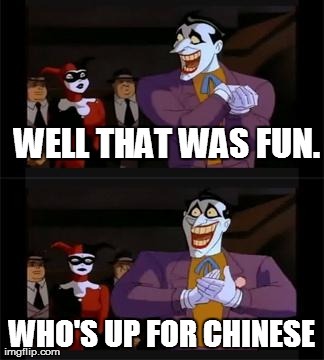
They take him home. While he sleeps, Emily rages over the fact that she loves such a insane bastard, and can't get over him. And, then, after Bob Balaban leaves, leaving Emily alone, Jessup wakes up.
He sweetly admits that the truth he learned was that there was no learnable truth, just unknowable horror, and all that's real is human experience. And he'll be a good boy from now on. Well too bad!
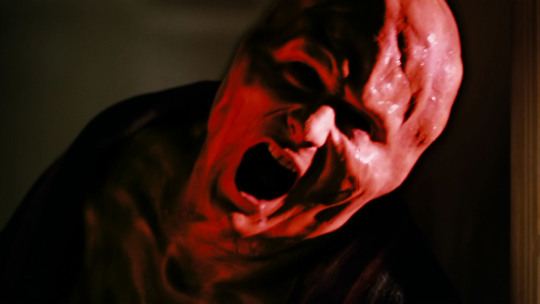
Because that horrible truth isn't done with him, and it's back to goo-Jessup! Emily tries to help him, grabbing him, but this in turn effects her, turning her into a shimmering lava form of herself. Both of them begin to self-destruct as Jessup, enraged, watching her in pain, struggles to retake his humanity, slamming himself into the wall, reforming himself through sheer will and physicality. He grabs her and brings her back, mirroring what she did for him during the final session. They embrace naked in the hallway. He finally admits, “I love you, Emily.”
Fade to credits.
Awww true love!
What can I say to sum up? Awesome 80's practical effects. Genius wacko go-for-it Ken Russell directing. Out of this world vision sequences. A awake and actually remarkable performance from William Hurt. An occasionally turgid but often fascinating script by the ever ornery Paddy Chayefsky. Whats not to like?
Well, the ending is a little rushed. The ape sequence goes on for a little too long and takes up perhaps too much of the films overall running time. The central love story is, well... a little hard to swallow, but hey, I guess there really is somebody out there for everyone. Even self-absorbed, deadbeat, cheating, sensory deprivation loving, ayahuasca dropping, Harvard teachers with a messiah complex!
And on that note, aliens from A.I. Artifical Intelligence, have a good day, and don't leave poor Teddy alone with no one to keep him company!
Sayonara!
2 notes
·
View notes
Text
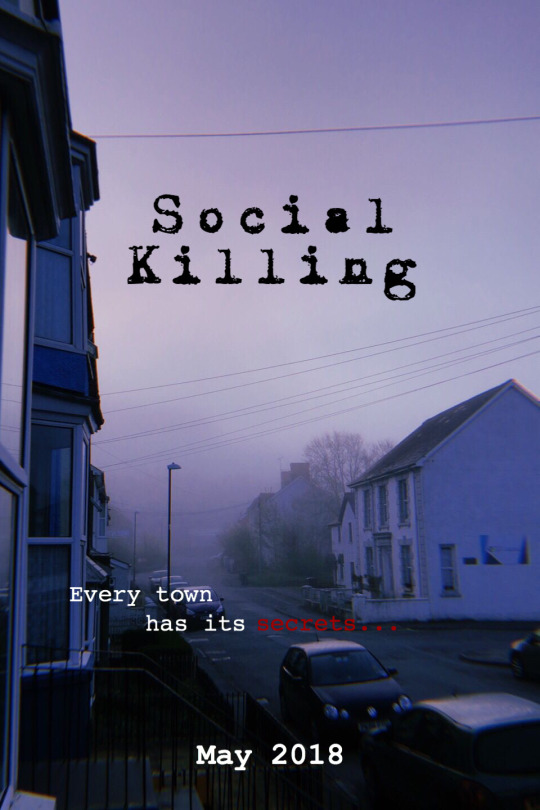
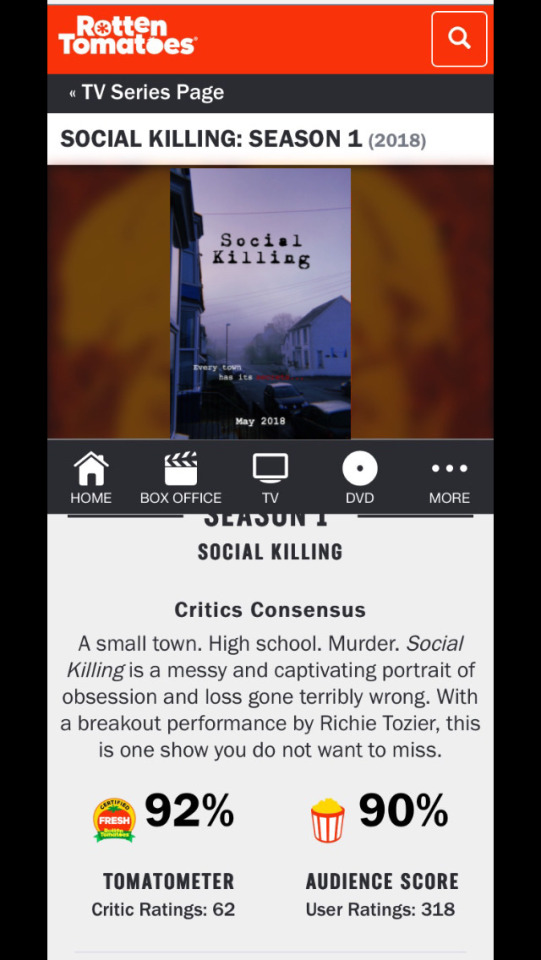
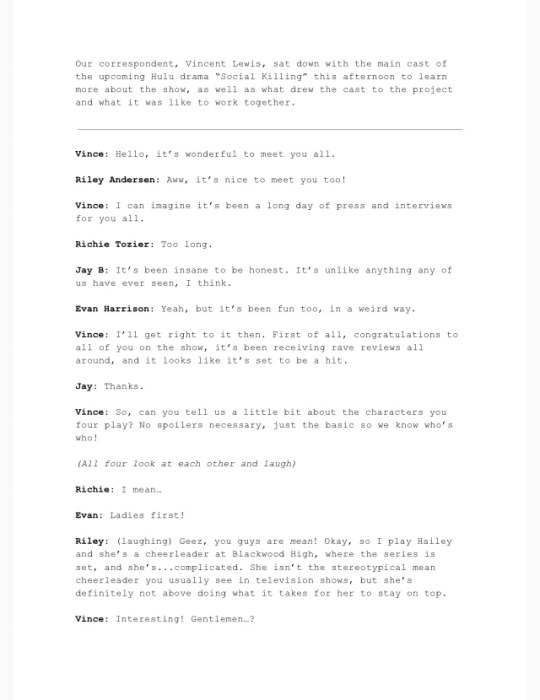



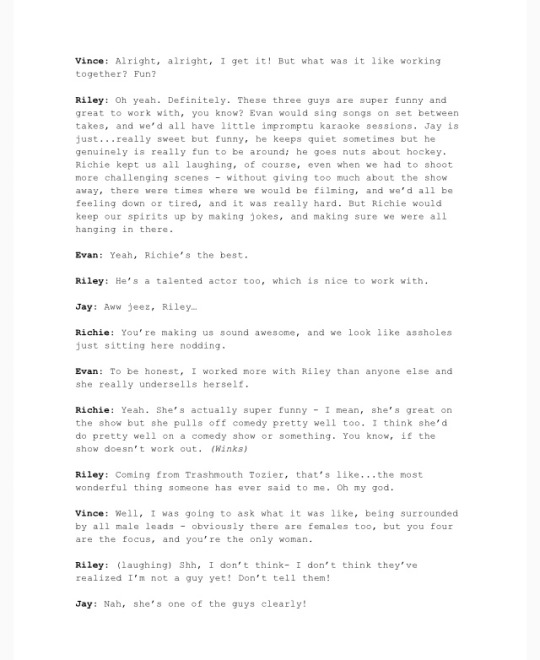
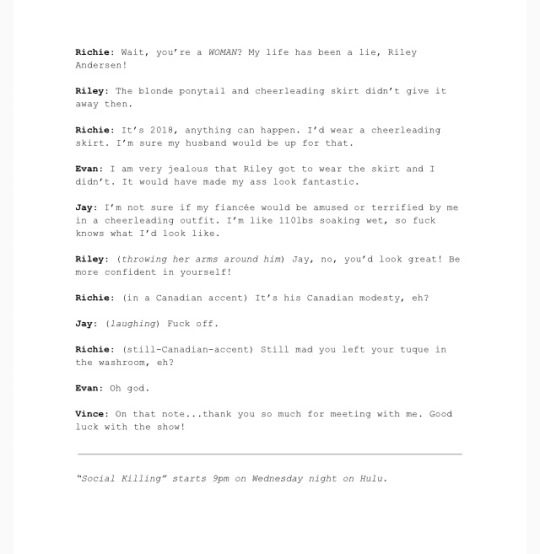
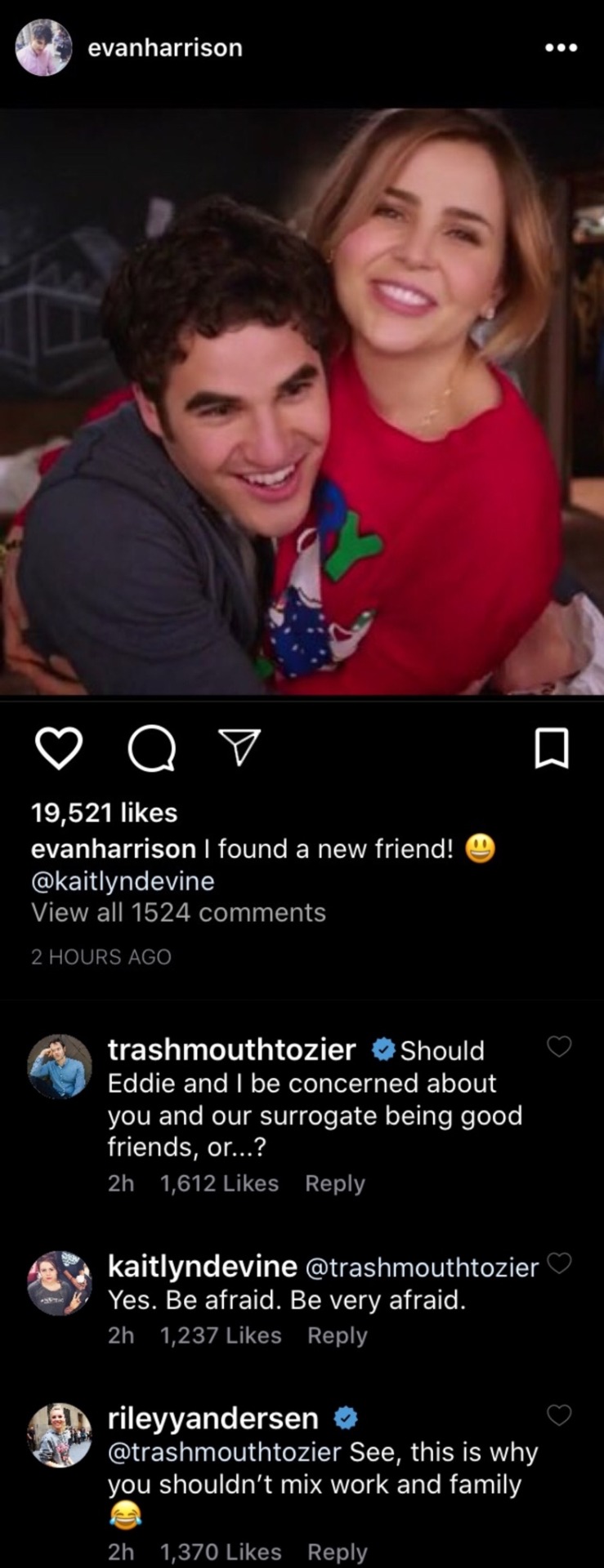

Social Media AU - Social Killing (Part 24)
We’ll be taking a little closer look at the show itself next time...and we’ll see just how Richie’s performance is recieved by the fans 👀
I know the writing for the interview is small, so I’ve put the transcript below just in case anyone needs it!
Also, yes, I am in fact a giant moron who wrote that Social Killing was a weekend-show, and have only now realized that in the interview, it says “Wednesday night” because I wrote it like a month back and forgot I put that. Please pretend that the publication in charge of the interview got the wrong day, and that it is in fact Sunday nights!
----------
Our correspondent, Vincent Lewis, sat down with the main cast of the upcoming Hulu drama “Social Killing” this afternoon to learn more about the show, as well as what drew the cast to the project and what it was like to work together.
Vince: Hello, it’s wonderful to meet you all.
Riley Andersen: Aww, it’s nice to meet you too!
Vince: I can imagine it’s been a long day of press and interviews for you all.
Richie Tozier: Too long.
Jay B: It’s been insane to be honest. It’s unlike anything any of us have ever seen, I think.
Evan Harrison: Yeah, but it’s been fun too, in a weird way.
Vince: I’ll get right to it then. First of all, congratulations to all of you on the show, it’s been receiving rave reviews all around, and it looks like it’s set to be a hit.
Jay: Thanks.
Vince: So, can you tell us a little bit about the characters you four play? No spoilers necessary, just the basic so we know who’s who!
(All four look at each other and laugh)
Richie: I mean…
Evan: Ladies first!
Riley: (laughing) Geez, you guys are mean! Okay, so I play Hailey and she’s a cheerleader at Blackwood High, where the series is set, and she’s...complicated. She isn’t the stereotypical mean cheerleader you usually see in television shows, but she’s definitely not above doing what it takes for her to stay on top.
Vince: Interesting! Gentlemen…?
Evan: Okay, so I play Blake, who’s this kind of preppy, snobbish guy who went to boarding school but has transferred to Blackwood for unknown reasons. He knows pretty much all the town’s secrets since he comes from a rich family and so he kind of has his links everywhere in town.
Jay: I play Sean, who’s this beloved teacher at the school - all the students love him since he’s not stuffy or uptight. He’s kinda the cool English teacher who’s probably smoked a spliff with all his students at some point. But he has a double life that no one knows about, and he wants it to stay that way because he’s seeking justice for something that’s happened to him in the past few years.
Richie:...Oh shit, me. I play a guy called Ted, and he’s brand new to town because he’s looking for a new start after something super tragic happened in his past. So he takes the drama teacher position that just opened up, and he starts to realize that something is kind of off about the town - which, you know, is kinda understatement of the fucking century!
Vince: So everyone’s got a secret then…
Riley: Basically none of us can be trusted, that’s what you should know.
Vince: Now obviously, Jay, you’ve been working pretty consistently in the business since you were young - you would do Canadian kids DIY shows and Québécois dubbing, is that correct?
Jay: Yeah. God, how fucking lame is that?
Vince: No, no, I used to love watching those Canadian kids shows! But since becoming an adult, you’ve done all sorts - comedy, obviously, drama, horror, animation...so what led you to “Social Killing”?
Jay: Well, I mean, my agent sent me a script and I was like ‘holy shit this could be good’; then I saw that Richie fucking Tozier was getting involved and I was like ‘okay, drop everything, I have GOT to do this damn show now’.
Vince: Did you two know each other before doing the show?
Richie: I mean, kinda. He came backstage at some of my shows a few times, and I was like ‘this guy is fucking awesome’. He’s Canadian, so that’s why.
Jay: I’m a very proud Canadian, yeah. Sorry, America, but Canada is the greatest country in the world.
Riley: America sucks right now, so don’t apologize.
Jay: But yeah, I’ve always wanted the chance to work with Richie on something since he’s one of my favourite comedians, so this was a huge opportunity for me.
Richie: And then he actually met me properly and regretted that shit.
(All of them crack up laughing)
Vince: As I understand it, Riley, you’re not entirely new to the world of show business either, because before joining the show you were a dancer.
Richie: Wait, what??
Riley: Yeah, I was. I was a professional dancer.
Jay: Jesus Christ.
Richie: A fucking PROFESSIONAL dancer?!
Riley: Oh come on, you guys knew I was a dancer!
Richie: Not professionally! I thought you just did it for a hobby, not as an actual job!
Riley: Anyway...I danced back-up for a few people, did some background dance work on movies and shows, but this is my first time acting.
Evan: And she’s incredible at it. It’s amazing.
Vince: As I understand it, Evan, you’re also brand new?
Evan: Well, this is my first big role. I did some theatre for a few years, played some gigs at bars to get by, but this is what I really want to be doing. I was so excited when I got cast that I nearly started crying - it’s a dream come true.
Riley: Aww.
Vince: Finally, Richie… You’re a fantastic stand-up comedian, I love your work, but this is your first time acting in anything. What made you want to transition from stand up to television, especially now?
Richie: Woah, yeah, I mean...yeah. (laughs) Honestly, I wanted to do something new. A lot of stuff has changed in the last few years, mostly the content of my stand-up, and I want to distance myself from that old shit as much as possible. And, you know, I’m married now, we’re expecting our first kid soon, so it’s all super serious and shit.
Vince: Congratulations!
Richie: Yeah, thanks! So with the show, I wanted to just...show that I could do it, I guess. Show I was more than just some shitty comedian doing misogynistic jokes that weren’t true. The writers approached me originally since they wanted some humor in the show, but...I guess they liked the other stuff I did once I was on-set.
Riley: Just for the record, I like your new stuff better.
Jay: Oh yeah, for real.
Evan: I still remember seeing the comeback show, first time you did your own material, and I was so blown away. Not just the actual material, but the way you performed and talked about your friends on-stage...it was amazing.
Richie: Thanks, man.
Vince: So, what was it like for the four of you to work together? Were there any scenes where all four of you were present?
Jay: Oh, man…
Evan: (mock dying) Spoilers. Can’t. Give. Them. Away.
Richie: Yeah, you can't see it, but in the building across the road there’s a Hulu representative with a sniper ready to take us out if they think we’ll fuck up.
Vince: Alright, alright, I get it! But what was it like working together? Fun?
Riley: Oh yeah. Definitely. These three guys are super funny and great to work with, you know? Evan would sing songs on set between takes, and we’d all have little impromptu karaoke sessions. Jay is just...really sweet but funny, he keeps quiet sometimes but he genuinely is really fun to be around; he goes nuts about hockey. Richie kept us all laughing, of course, even when we had to shoot more challenging scenes - without giving too much about the show away, there were times where we would be filming, and we’d all be feeling down or tired, and it was really hard. But Richie would keep our spirits up by making jokes, and making sure we were all hanging in there.
Evan: Yeah, Richie’s the best.
Riley: He’s a talented actor too, which is nice to work with.
Jay: Aww jeez, Riley…
Richie: You’re making us sound awesome, and we look like assholes just sitting here nodding.
Evan: To be honest, I worked more with Riley than anyone else and she really undersells herself.
Richie: Yeah. She’s actually super funny - I mean, she’s great on the show but she pulls off comedy pretty well too. I think she’d do pretty well on a comedy show or something. You know, if the show doesn’t work out. (Winks)
Riley: Coming from Trashmouth Tozier, that’s like...the most wonderful thing someone has ever said to me. Oh my god.
Vince: Well, I was going to ask what it was like, being surrounded by all male leads - obviously there are females too, but you four are the focus, and you’re the only woman.
Riley: (laughing) Shh, I don’t think- I don’t think they’ve realized I’m not a guy yet! Don’t tell them!
Jay: Nah, she’s one of the guys clearly!
Richie: Wait, you’re a WOMAN? My life has been a lie, Riley Andersen!
Riley: The blonde ponytail and cheerleading skirt didn’t give it away then.
Richie: It’s 2018, anything can happen. I’d wear a cheerleading skirt. I’m sure my husband would be up for that.
Evan: I am very jealous that Riley got to wear the skirt and I didn’t. It would have made my ass look fantastic.
Jay: I’m not sure if my fiancée would be amused or terrified by me in a cheerleading outfit. I’m like 110lbs soaking wet, so fuck knows what I’d look like.
Riley: (throwing her arms around him) Jay, no, you’d look great! Be more confident in yourself!
Richie: (in a Canadian accent) It’s his Canadian modesty, eh?
Jay: (laughing) Fuck off.
Richie: (still-Canadian-accent) Still mad you left your tuque in the washroom, eh?
Evan: Oh god.
Vince: On that note...thank you so much for meeting with me. Good luck with the show!
“Social Killing” starts 9pm on Wednesday night on Hulu.
#richie tozier#eddie kaspbrak#social media au#reddie#it#it chapter 2#it chapter two#wow can you believe that the interviewer got the wrong day of the week? ha weird am i right
52 notes
·
View notes
Text
Memento and the Significance of Sammy Jankis
https://ift.tt/eA8V8J
“Have I told you about Sammy Jankis?”
On March 16, 2001, Christopher Nolan announced himself to the world with the US release of Memento. Not that everyone heard him straight away.
Despite garnering rave reviews on the festival circuit, Nolan’s mind-bending jigsaw puzzle of a movie failed to land a major distribution deal in the States. In the end Newmarket Films, the independent production company bankrolling the project, took the plunge and distributed it themselves.
Memento went on to earn more than $45 million at the US box office from a $4.5 million budget – a huge sum for an independent film.
Within five years, Nolan would move on to bigger and Bat-er things, but Memento remains among his most ambitious and effective films to date. A non-linear neo-noir that doubles up as a psychological thriller, it’s a film that continues to offer up subtle surprises on repeat viewing.
Guy Pearce takes centre stage with a mesmeric performance as Leonard, a man with short-term memory loss trying to track down his wife’s murderer. His pursuit is hampered by an inability to create new memories.
It’s a similarly disorientating experience for viewers who must piece together Leonard’s story while it plays out in reverse order. Allied to this is the story of Sammy Jankis, played by Stephen Tobolowsky, which intersperses that of Leonard’s and plays out across a series of black-and-white scenes shown in chronological order.
Narrated by Leonard, from an apparent recollection of a case he took during days as an insurance investigator, like our protagonist, Sammy also claims to be anterograde amnesiac – and that’s not all they have in common.
The film continues to alternate between the two narratives, with Leonard obsessively telling the tale of Sammy to anyone who will listen, before the two stories eventually converge in a climax where their shared plight becomes painfully apparent.
Despite its modest budget, Memento boasted an impressive cast. Pearce had shot to mainstream fame with LA Confidential a few years earlier while Joe Pantoliano, who played Leonard’s helper/fixer Teddy, was an established figure in the business along with his co-star from The Matrix, Carrie Anne Moss.
There was even a role for future Sons of Anarchy star and Nolan favourite Mark Boone Junior as the underhand manager of the motel where Leonard lives. Tobolowsky more than held his own though.
A seasoned character actor, by the time Memento came around he had enjoyed a memorable turn in Groundhog Day as the hilariously grating insurance agent Ned Ryerson. But it hadn’t been without its drawbacks in the years that followed.
Tobolowsky explained to Den of Geek: “The good news and bad news of being Ned in Groundhog Day is, guess what? You’re going to be Ned in Groundhog Day for the rest of your career. A lot of times when people are in comedic roles and want to do something more dramatic, it’s not available to them. Especially with something like Groundhog Day. An actor like me could get an opportunity to be in a drama but it might not work out because the audience would still see Ned Ryerson. Not this role. Sammy Jankis was so remarkably different.”
Landing the role of Jankis proved remarkably different too, starting with Nolan’s script, based on a short story written by his brother Jonathan called Memento Mori.
“My agent called me up and said John Papsidera, a casting director, wanted me to take a look at this script. John had a reputation for doing really unusual and generally good movies so I was very happy to. A standard first draft script is usually around 120 pages before a producer or director gets their hands on it. Because of the way it is formatted, one page should equal around one minute of screen time. I got the screenplay for Memento and it was like the Old and New Testament combined. I had never seen a script so big. I don’t remember the exact page numbers but it was in the 300s.”
Having seen his fair share of scripts over the years, Tobolowksy was apprehensive about reading what looked like the equivalent of “Gone with the Wind times ten.”
“I was thinking to myself ‘Oh God, this is going to be terrible. ’I even said to my wife, ‘ I know it’s going to be awful. It’s three times longer than normal but I’m going to read it just to be a good sport.’ I start reading and I’m halfway through and my wife comes in and I’m saying ‘damn it, damn it’ and she says ‘Terrible?’ and I say ‘No, so far really great but there’s no way these writers can continue at this level. It’s going to crap out by the end.”
“I get to the end and I throw the script across the room and my wife hears me, comes in, and says ‘Terrible?’ and I say ‘No, quite possibly the best script I’ve ever read.’” Nolan’s script was unlike any Tobolowsky had read, bringing the filmmaker’s vision for the movie to life in stunning detail.
“Chris and Jonathan wrote it in a way where they describe exactly what the camera is doing. Everything was perfectly described and you got a picture of the movie in your head, backwards and forwards in time. It was mind-blowing. I called up my agent immediately and said I had to meet Chris Nolan. I had to talk to him about Sammy Jankis.”
Despite few lines, the role of Sammy was a significant one. A part that much of the film’s plot ultimately rested on. Determined to make the role his own and shake off the ghost of Ned, Tobolowsky met with Nolan knowing he had a unique selling point when it came to the role.
“I said ‘Chris, I didn’t come here to read for you. There’s nothing really for me to read, but this is what I want to tell you: this is quite possibly one of the best screenplays ever written. You are going to have actors all over this city that will want to be in this. However, I am going to be the only person that wants to be Sammy Jankis who has actually had amnesia.’
Chris said: ‘You’ve had amnesia?’ and I was like ‘Yes, and this is how it happened…’”
Tobolowsky explained that during surgery for a kidney stone, doctors had used an experimental drug in place of the standard anesthesia.
“I’m a big guy, like six foot three and 210 pounds, so they gave me a new drug that they had been using on bigger people. It means they are able to give instructions to the patient like to get up on the operating table, rather than have orderlies lifting them. The patient performs the task and then forgets it had happened. It worked the same with the pain.”
It led to what he describes as “drug induced amnesia” as the medication worked its way through his system. “I would be in my living room and then boom! It was like I was just born. The worst was when I was standing over the toilet and suddenly didn’t know if I was about to pee or if I had already peed. Fortunately, I heard my wife yell ‘you finished ten minutes ago!’”
The description of his ordeal was enough to convince Nolan he was the man for the job – but that was only the start of the challenge for Tobolowsky.
“It was the most difficult part I have ever played in my life. When you are an actor, the thing that moves you through a scene is your motivation. But when your character can’t remember anything, you don’t have that.”
In order to better portray Sammy’s damaged mind, he began by breaking down the character’s actions into behaviors marked as either old or new.
“There are the old, every day, behaviors we don’t think about like making breakfast. The rote nature of that behavior means you might do it quickly, almost mechanically. Then there is the newer stuff that takes longer because you are trying to understand what you are doing for the first time.
“I had met people who have lost their memory, through Alzheimer’s or an accident, and noticed how these old behaviors were still familiar to them.”
This attention to detail was not lost on audiences.
In one small but memorable moment, Sammy greets Leonard at the door of his home with a look Leonard initially believes to be recognition and proof he is faking his condition.
It’s only later, when Leonard begins to understand his own plight, that Nolan has us revisit that same look, only this time with the realisation Sammy’s expression is instead one of desperate hope with that complex duality perfectly conveyed by Tobolowsky.
“That look was about putting out a message saying ‘I am sorry I may know you, so I don’t want to embarrass myself or you by acting like I don’t know you,’” Tobolowsky explains.
Later, after Leonard has rejected Sammy’s insurance claim, his wife, played by Frasier star Harriet Sansom Harris, decides to test the theory for herself by having him administer shot after shot of insulin, in the hope he will realise his mistake before she suffers a fatal overdose.
It’s then that we see Tobolowsky channeling the mechanical, emotionless actions of old, going through the motions of giving his wife the shot, as he has always done, oblivious to the tragic implications for both characters.
But Sammy is oblivious, with Tobolowsky’s emotionless, robotic approach to the repeated injections – something he has done for years – adding a layer of tragedy simultaneously to both characters.
“We all worked it out together in the moment. You let the truth emerge from the scene in the moment the camera is running.”
However, the true significance of Sammy in the wider story of Leonard only fully emerges later in the film after the latter’s revelatory encounter with Teddy.
It’s Teddy who reveals that he has been using Leonard to kill criminal associates. He claims to have tracked down the real “John G” behind the murder of Leonard’s wife years ago and, most tellingly, that Sammy’s story is actually Leonard’s, created to absolve himself of guilt.
Which begs the question: Are Sammy and Leonard simply one and the same person? And, if so, did Leonard kill his wife by accident?
While some degree of ambiguity remains, Tobolowsky says such notions played into Nolan’s decision to include a blink-and-you’ll-miss-it moment where Sammy, holed up in an old folk’s home, is for a brief flash, replaced by Leonard.
“Chris played with the idea on set. He said he had an idea for a moment where he would replace me with Guy. He wanted to try that out. That was determined while filming, the idea of the switch, which cements the idea of the two characters being one and the same.
“Chris was mining the depths of his script in the moment, which takes nerve as an artist. “
Reflecting on the experience, Tobolowsky only has positive memories of his experience on Memento, and the commitment shown by Pearce – particularly when it came to the tattoos that serve as reminders to Leonard of his past and forgotten present.
“Guy Pearce was just magnificent,” he says. “Every day, he would be in the chair getting those tattoos put on or removed. There would be long make-up breaks to get them adjusted perfectly and Chris would have it so that we would be shooting while Guy was in the makeup trailer.”
“Chris was a fabulous director to work with. Full of good humour and insight. The entire shoot was filled with energy and fun and that came from the top. I knew right away I was working with somebody very special. Chris takes chances.”
Tobolowsky holds his experience on Memento in the highest regard.
“When you do a lot of shows and movies, the idea is not how many you can squeeze in, it’s about which ones mattered to you. The work you did that affected you as a person and an artist. Something like Memento is profoundly affecting with the questions it asks.
“What haunts me about Sammy Jankis was that idea that if you cannot remember what you do, both your sins and your blessings, what kind of hell are you in? That final scene where Sammy is the old folk’s home, there is this question: Is he at peace? If you don’t know what is happening to you, what is your life? And what happens to Leonard?
He also credits the film with changing his career for the better.
“After I did Memento, I was considered for all sorts of roles that I wouldn’t have been before. It broke the Groundhog Day mold and showed what I was capable of.
cnx.cmd.push(function() { cnx({ playerId: "106e33c0-3911-473c-b599-b1426db57530", }).render("0270c398a82f44f49c23c16122516796"); });
“There have been so many movies I have been in. Some terrible, some mediocre and a few classics. It always comes down to the script and director. Memento is one of the good ones. It’s a masterpiece. There’s nothing quite like it.”
The post Memento and the Significance of Sammy Jankis appeared first on Den of Geek.
from Den of Geek https://ift.tt/30SAPVO
2 notes
·
View notes
Text
January 26, 2021: The Expendables (Epilogue)

...
Let’s just get this over-with. Spoilers ahead or whatever.
Review
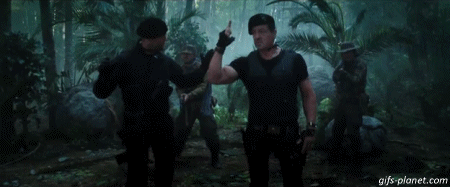
Cast and Acting
Yeah, OK, it’s exactly what you’d expect from this roster. Just to repeat it, this film features Sylvester Stallone, Jason Statham, Jet Li, Dolph Lundgren, Randy Couture, Terry Crews, Mickey Rourke, Steve “Stone Cold” Austin, Eric Roberts, Bruce Willis, and Arnold Schwarzenegger. And if you look at that...you can guess how the acting in this film is. You can’t see past these actors into the characters, they’re mostly just playing themselves. Now, that’s not to say that this is bad; it’s just not anything stellar. If I was to call out performances, it’d be Statham as the runner-up (he does well with his romantic crises), and ABSOLUTELY Mickey Rourke, who somehow not only disappeared into the role of Tool, but also happens to be THE ONLY PERSON I CARE ABOUT IN THIS MOVIE. I mean that, he’s a complete character with a haunted past, and Rourke actually does a great job with his few scenes. And so, for the cast and acting...6/10. Crews and Couture are also pretty fun, by the way.

Plot and Writing
Again: you get what you’d expect with this movie, and honeslty...3/10. Yeah, it’s the most standard “badass mercenary” plot EVER, and the writing is so peppered with ‘80s style one-liners that it feels like Sylvester Stallone wrote this movie...which is because he did, alongside storywriter David Callaham. But Callaham, who has DONE THINGS I LIKE (Godzilla, Ant-Man) wrote the story; Stallone wrote a lot of the script for this movie, and it feels extremely dated sometimes. Yin Yang? REALLY? Jesus. 3/10.
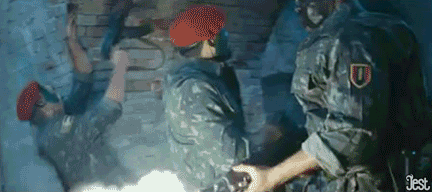
Directing and Action
SHAKY CAM. GUUUUUUUUUUH THE SHAKY CAM. And outside of that, the direction was OK, I guess. Definitely feels like an ‘80s movie, almost like Sylvester Stallone himself dire-you know where this is going. And what about the action? Explosions are cool, I’ll give you that. The knife and gun stuff is very hindered by the REALLY bad blood effects, holy shit. And the hand-to-hand? It’s weirdly not great. Feels fake, feels stilted, and the choreography honestly isn’t amazing. Which, given the people in this movie, is a miracle? Like, wow, this should have been FAR better. 4/10.

Production and Art Design
Um...5/10? Had an environment, but somehow no atmosphere? This film felt empty. This film made me feel empty. Sets, props, and clothing existed, sure, but I can’t say they were stellar. Honestly, they were just kind of...there. Average. Nothing to write home about. So yeah, 5/10.

Music and Editing
Yeah, I genuinely don’t remember the music in this movie. Not to mention the fact that it was weirdly quiet at some points? Composed by Brian Tyler, who has DONE THINGS I LIKE (Transformers: Prime, Iron Man 3, Avengers: Age of Ultron, Power Rangers), it just isn’t memorable to me...AT ALL. Like most of this movie. As for the editing...eh, it was OK? Shaky cam may have been an issue, but that isn’t the editor’s fault. Nothing here to report. 6/10.

48%. I FEEL...NOTHING.
This movie...this movie hurts. How? HOW CAN THIS MANY ACTION BLOCKBUSTER STARS BE IN IT, AND I DON’T LIKE IT? For God’s sakes, I LIKE LAST ACTION HERO MORE THAN THIS MOVIE. This is my lowest scoring movie this month. Which is AMAZING to me.
I just...I’m so disappointed. I need something to pick me up from this, I’m SO let down. Well, guess I’m just gonna have to move on to the next of this set: the constantly recommended action movie. Sure. Whatever.

#the expendables#the expendables 1#sylvester stallone#barney ross#jason statham#jet li#dolph lundgren#randy couture#terry crews#steve austin#stone cold steve austin#mickey rourke#eric roberts#365 movie challenge#365 movies 365 days#365 Days 365 Movies#365 movies a year#movie challenge#charisma carpenter#Giselle Itié#action january
5 notes
·
View notes